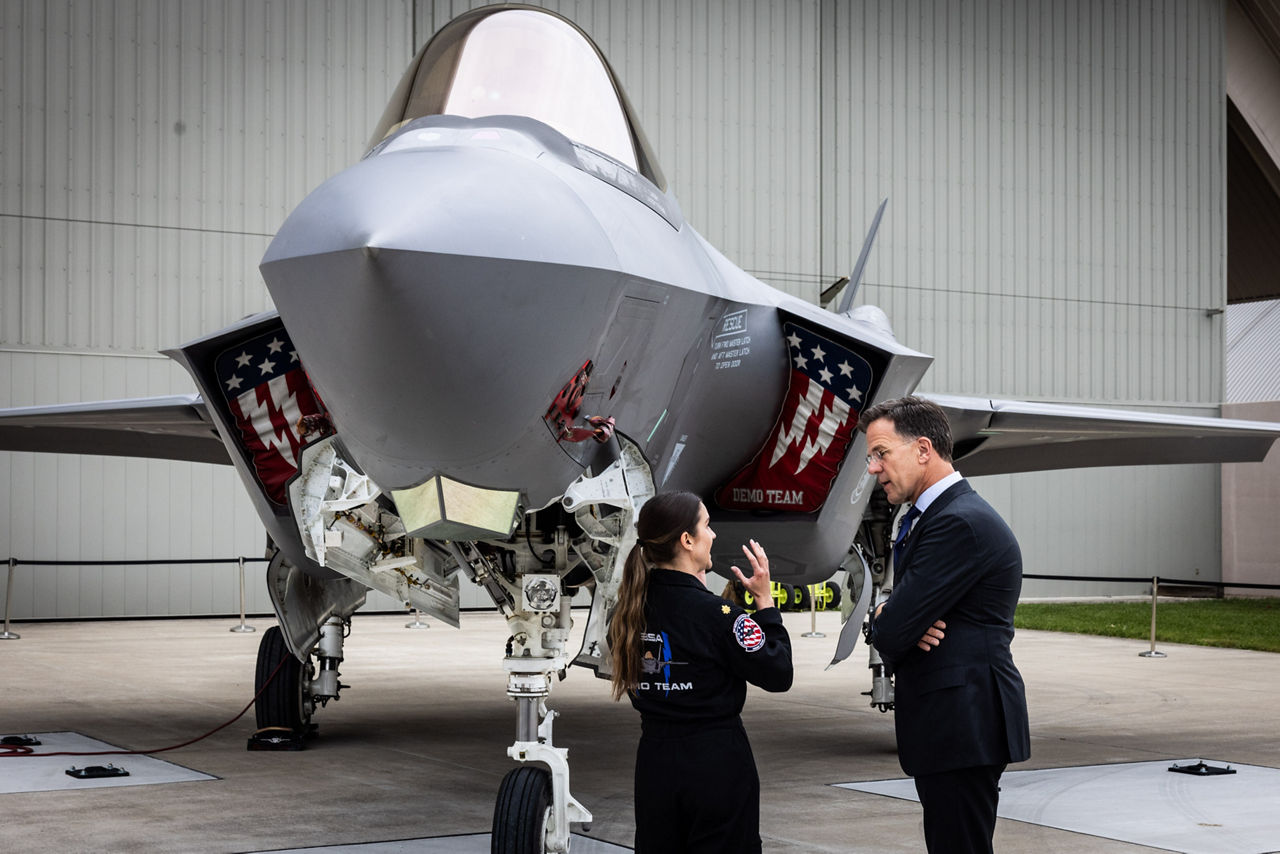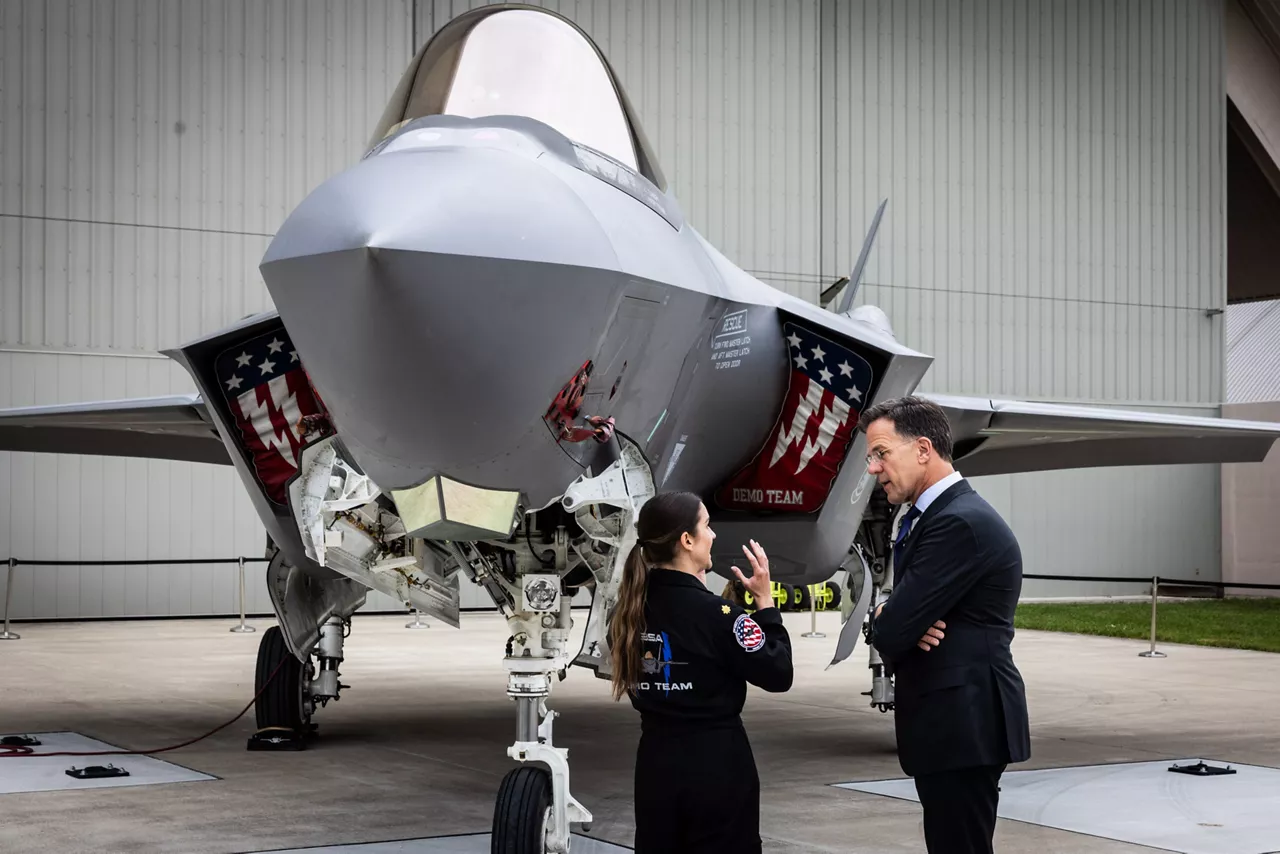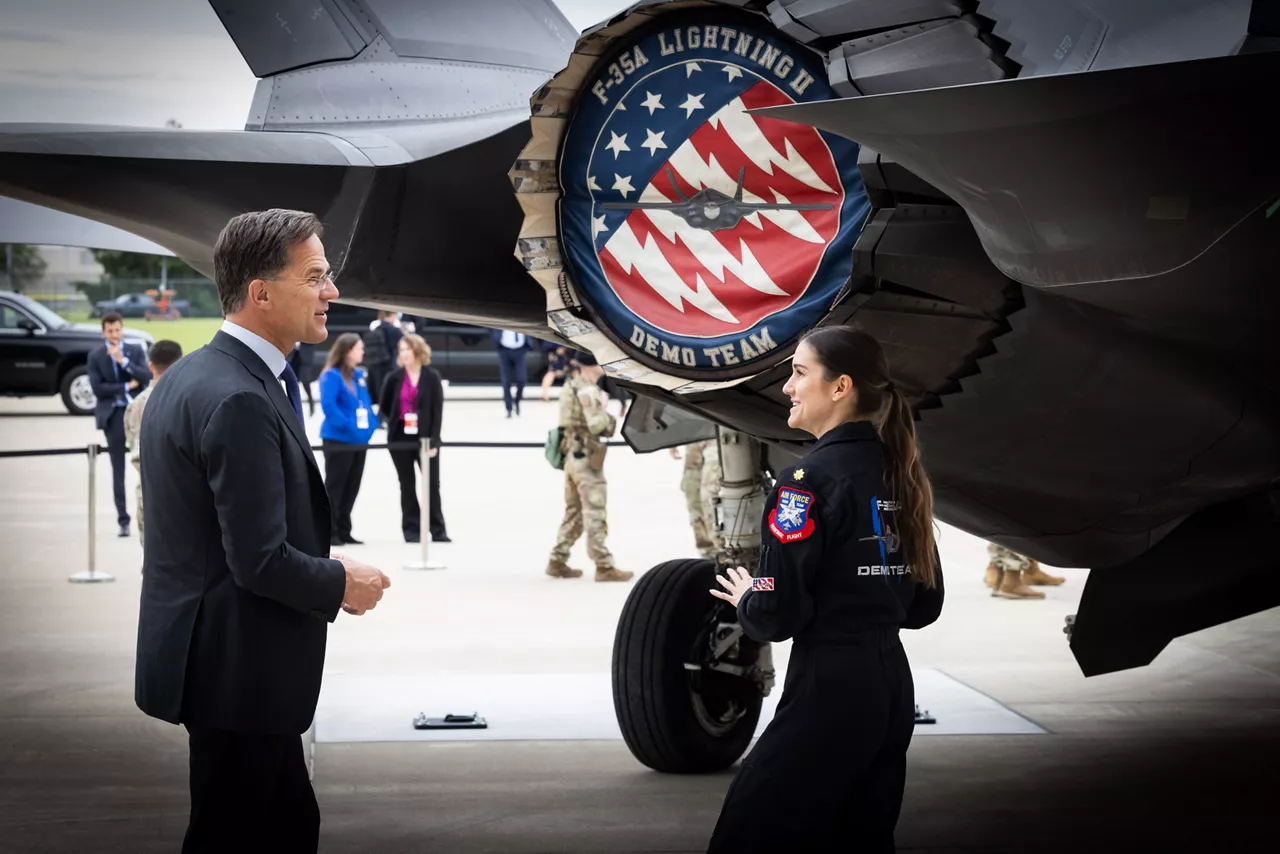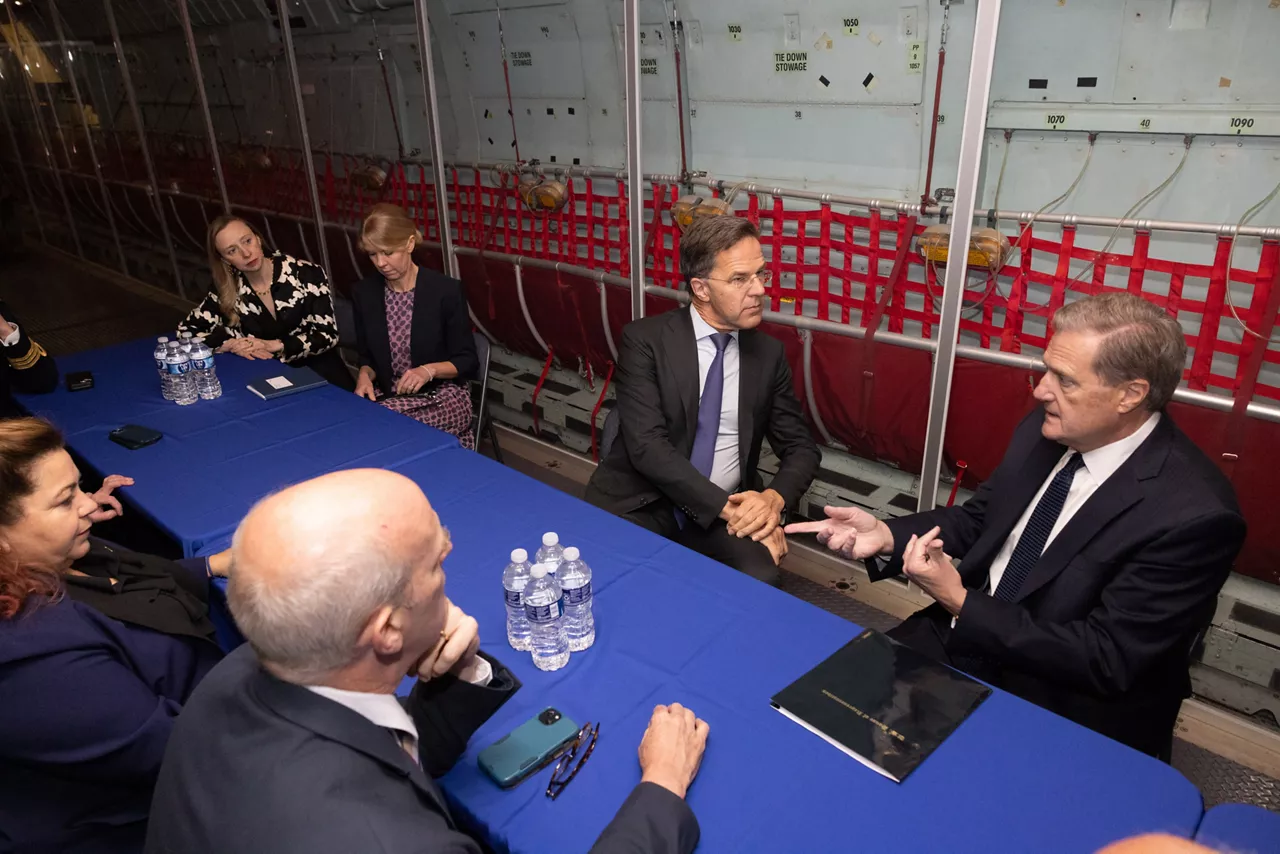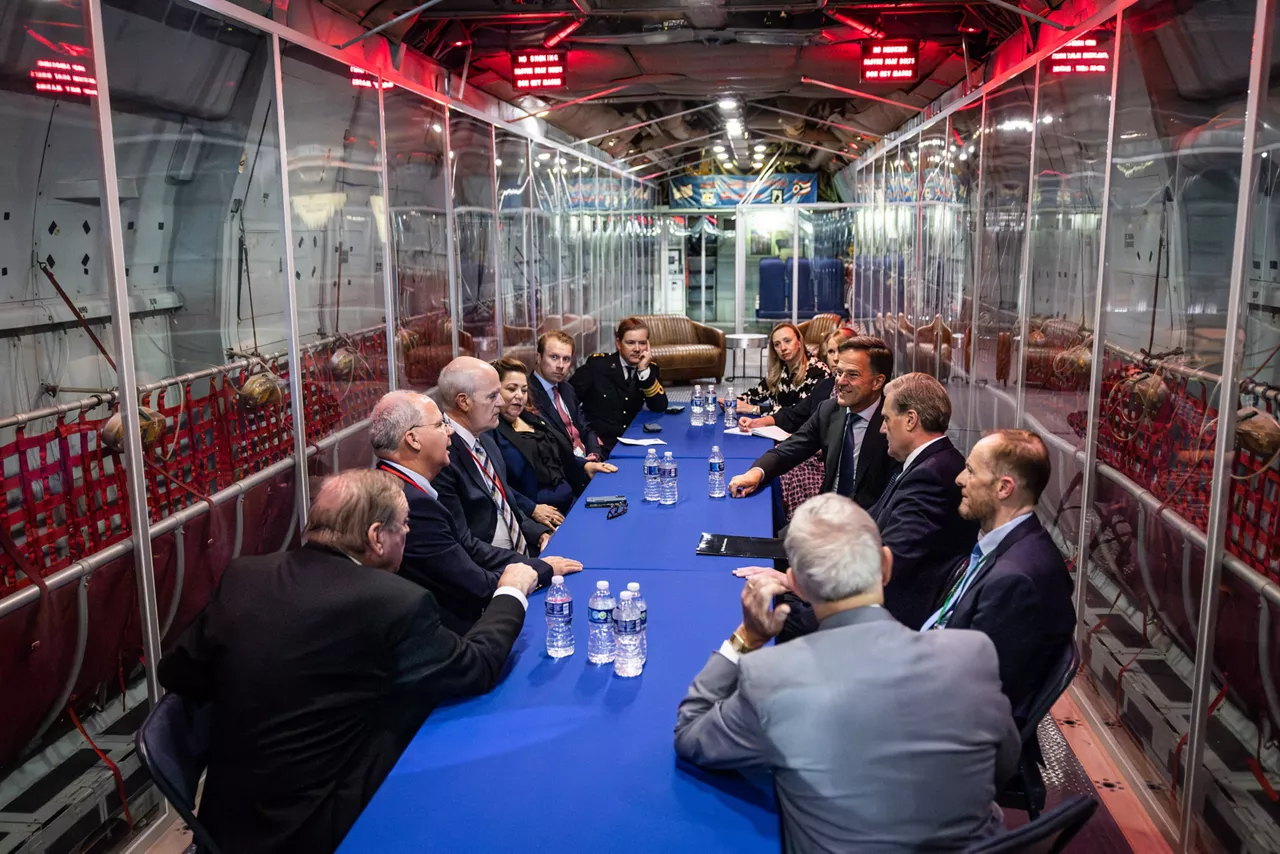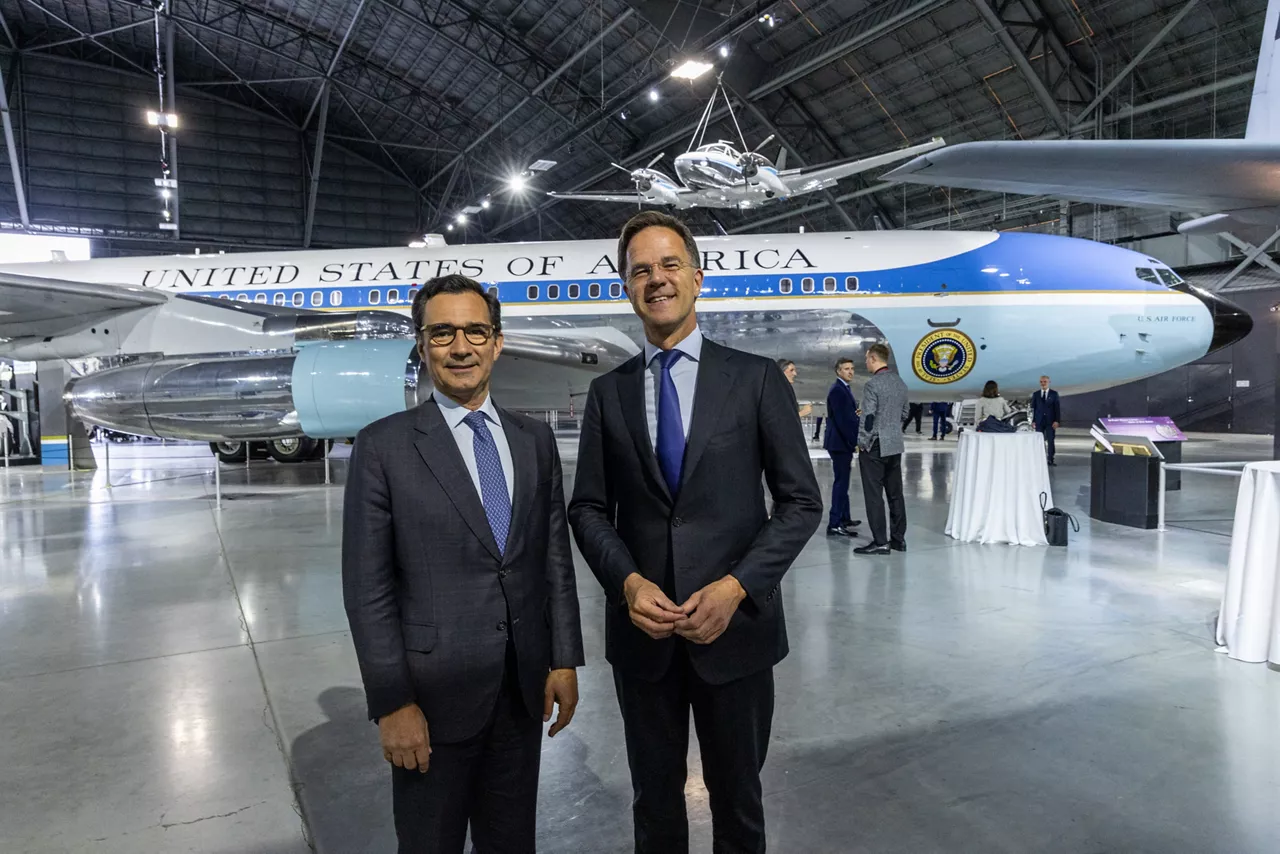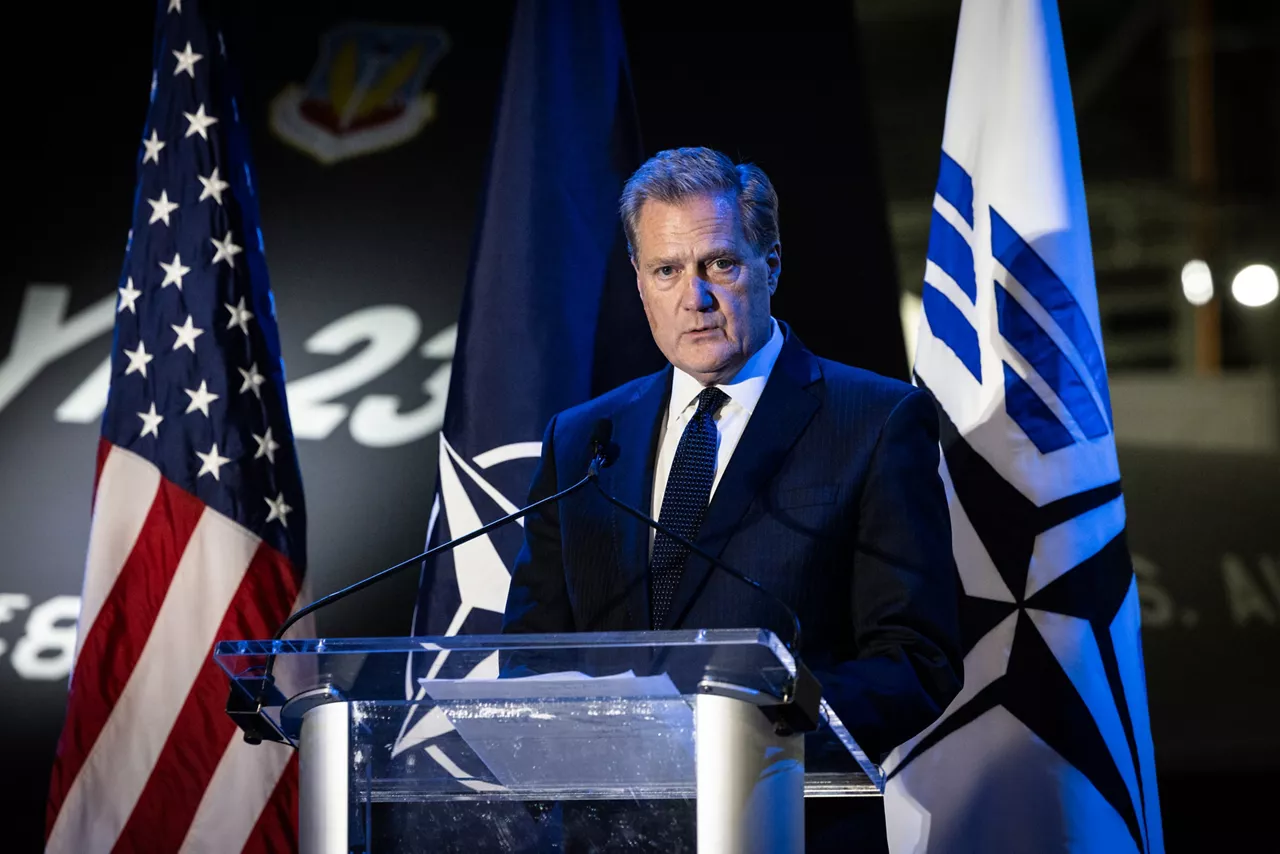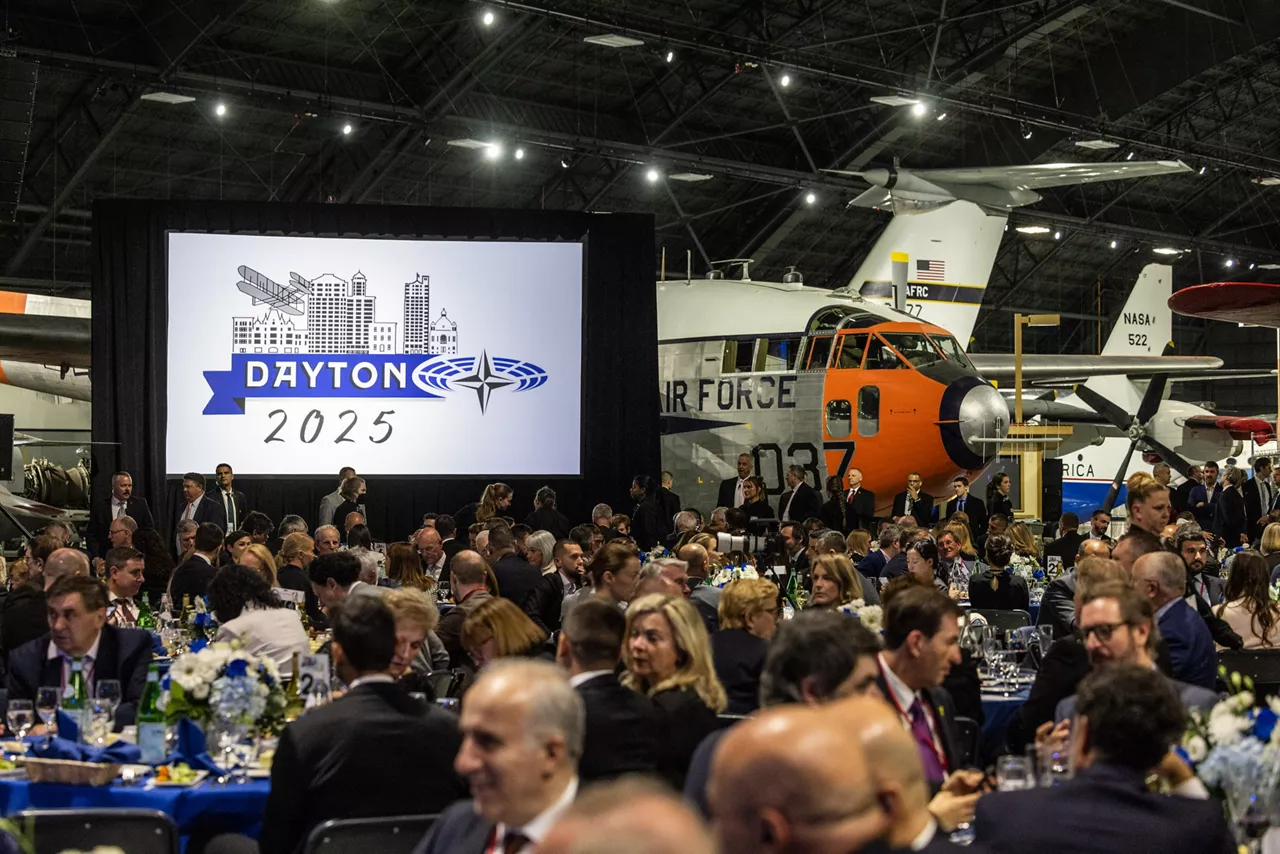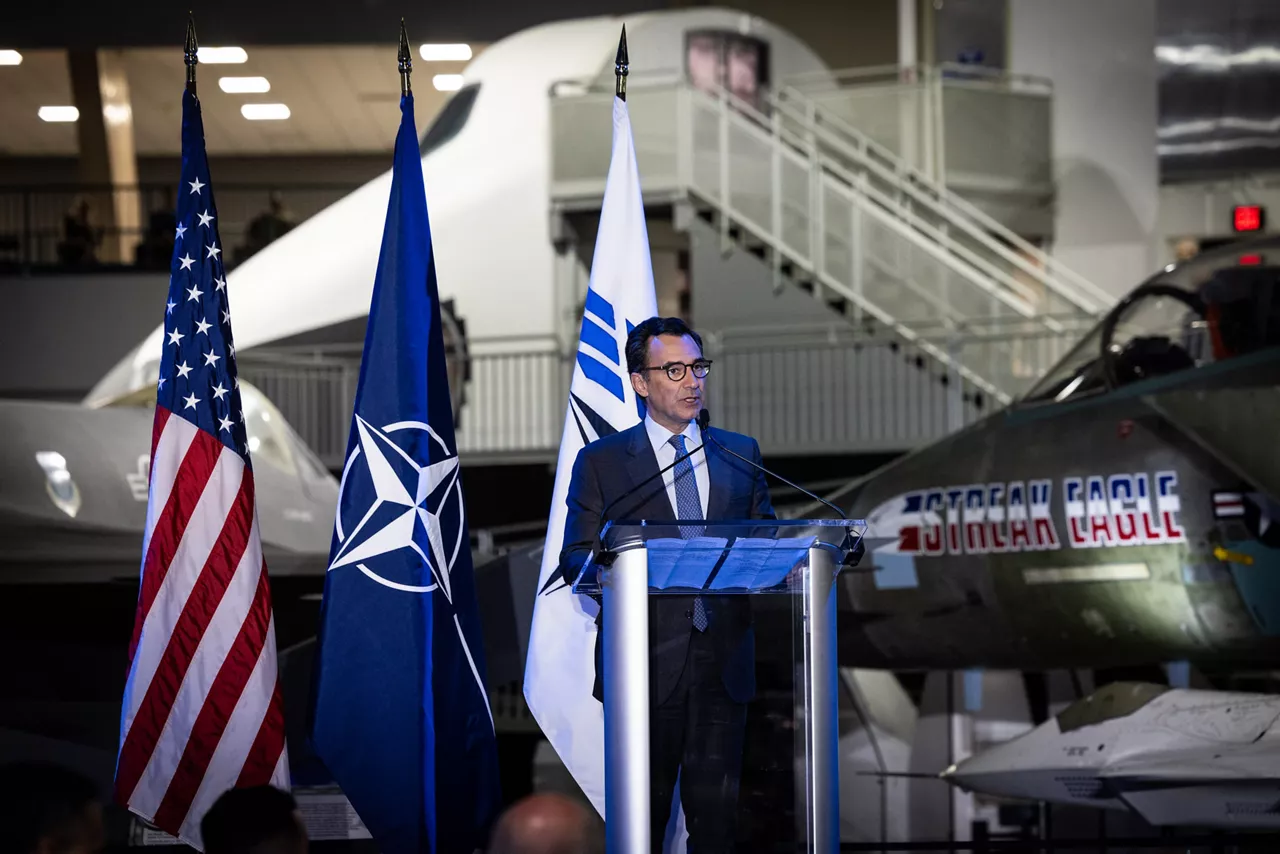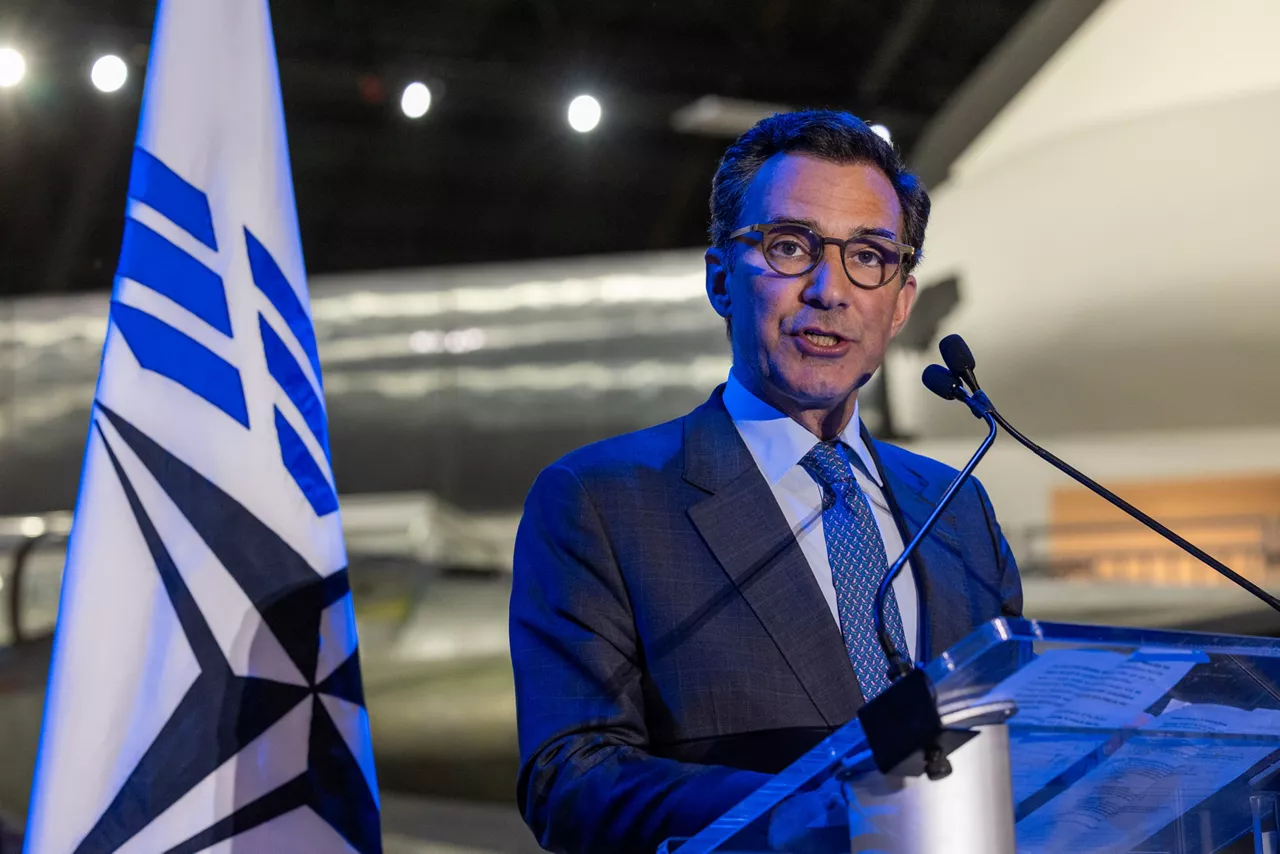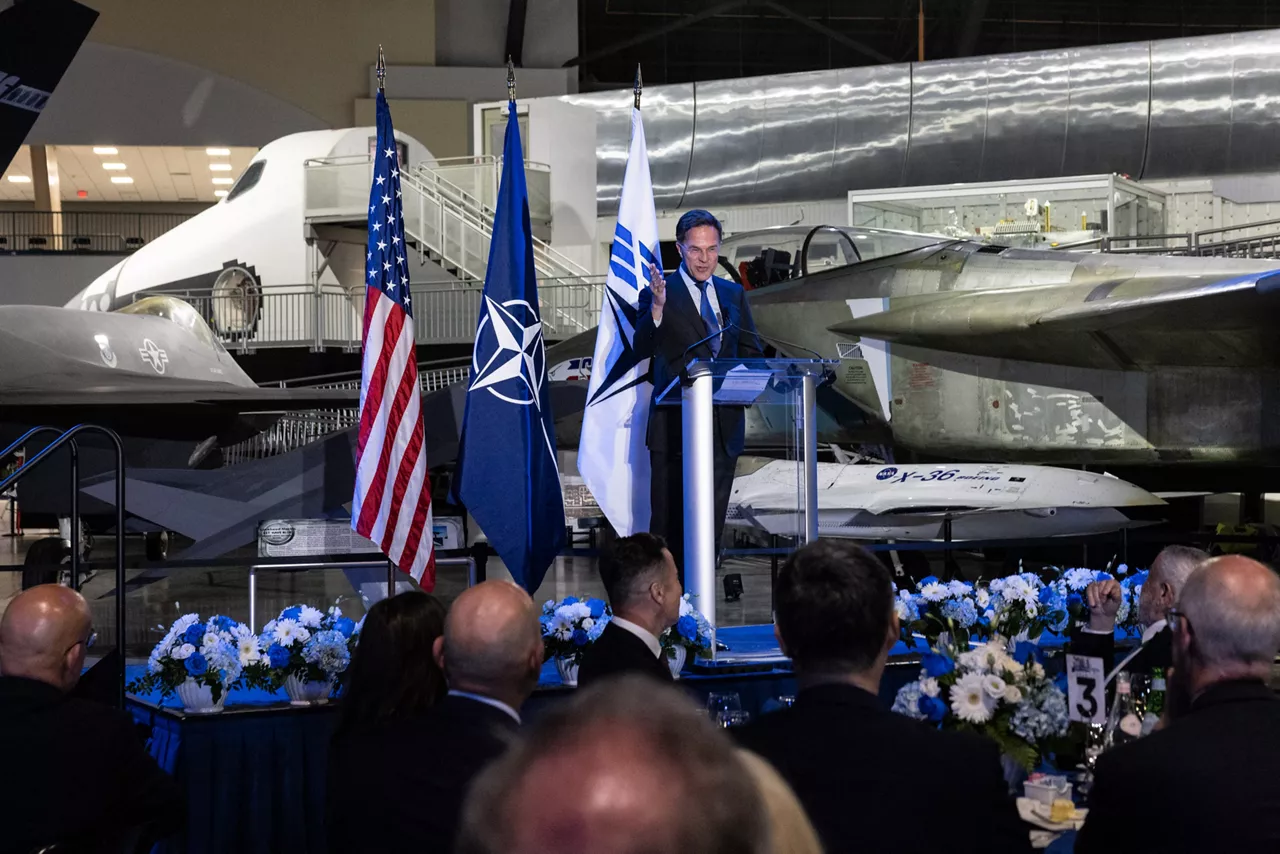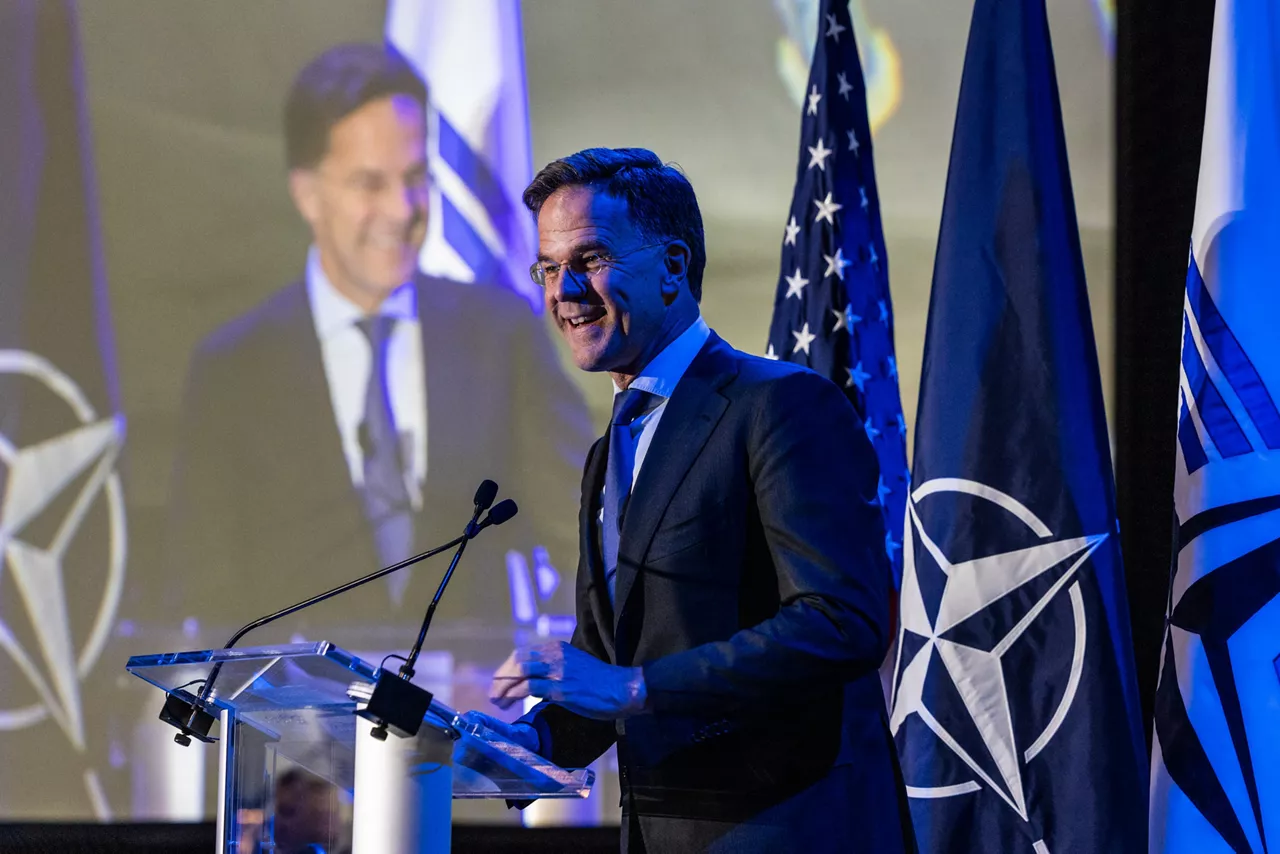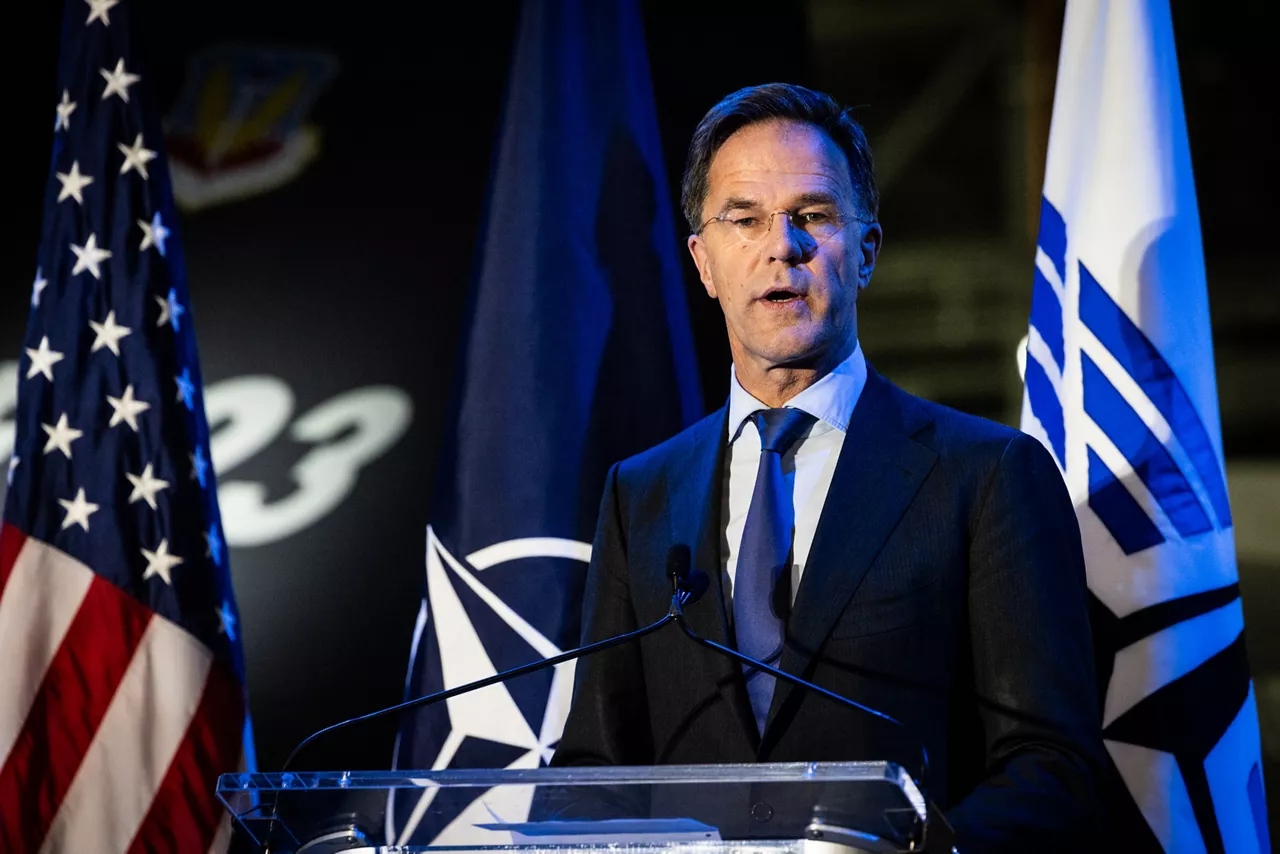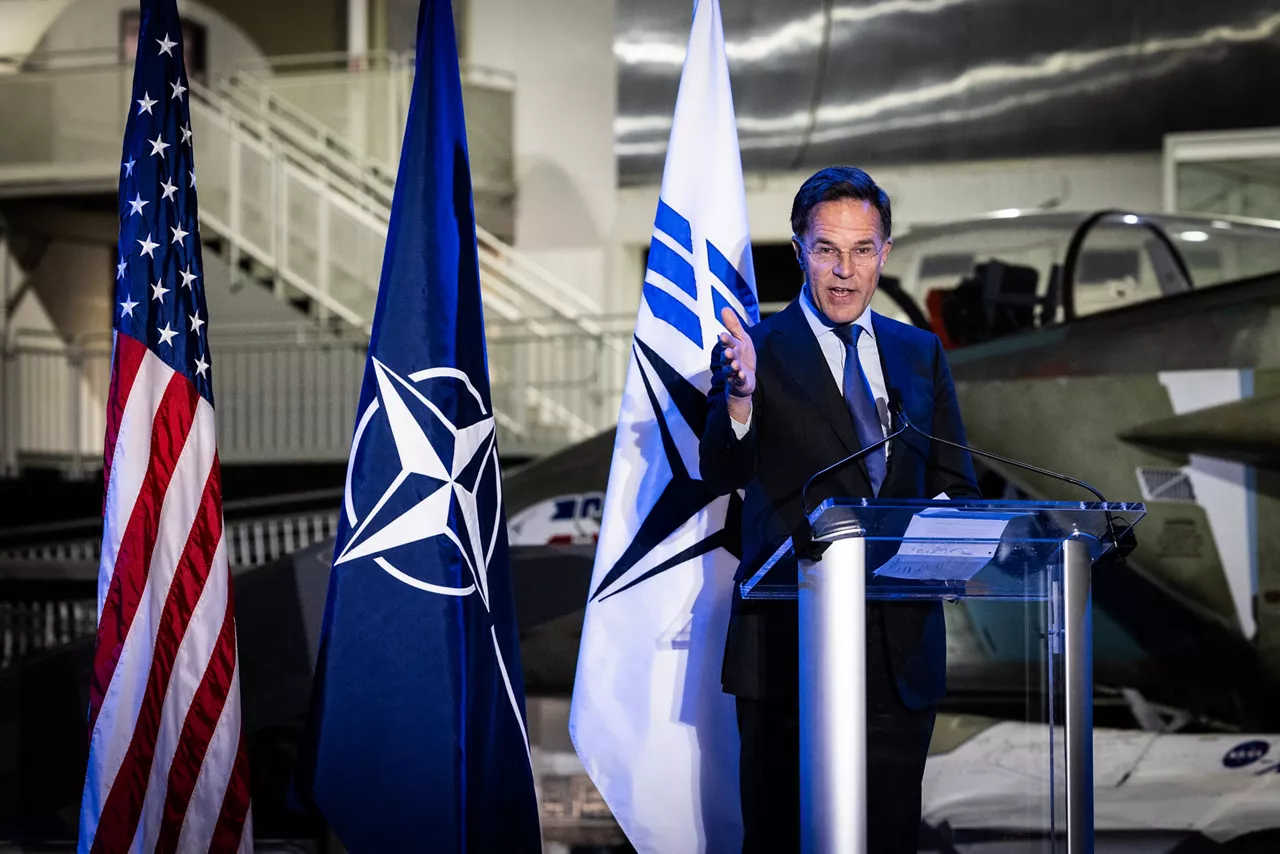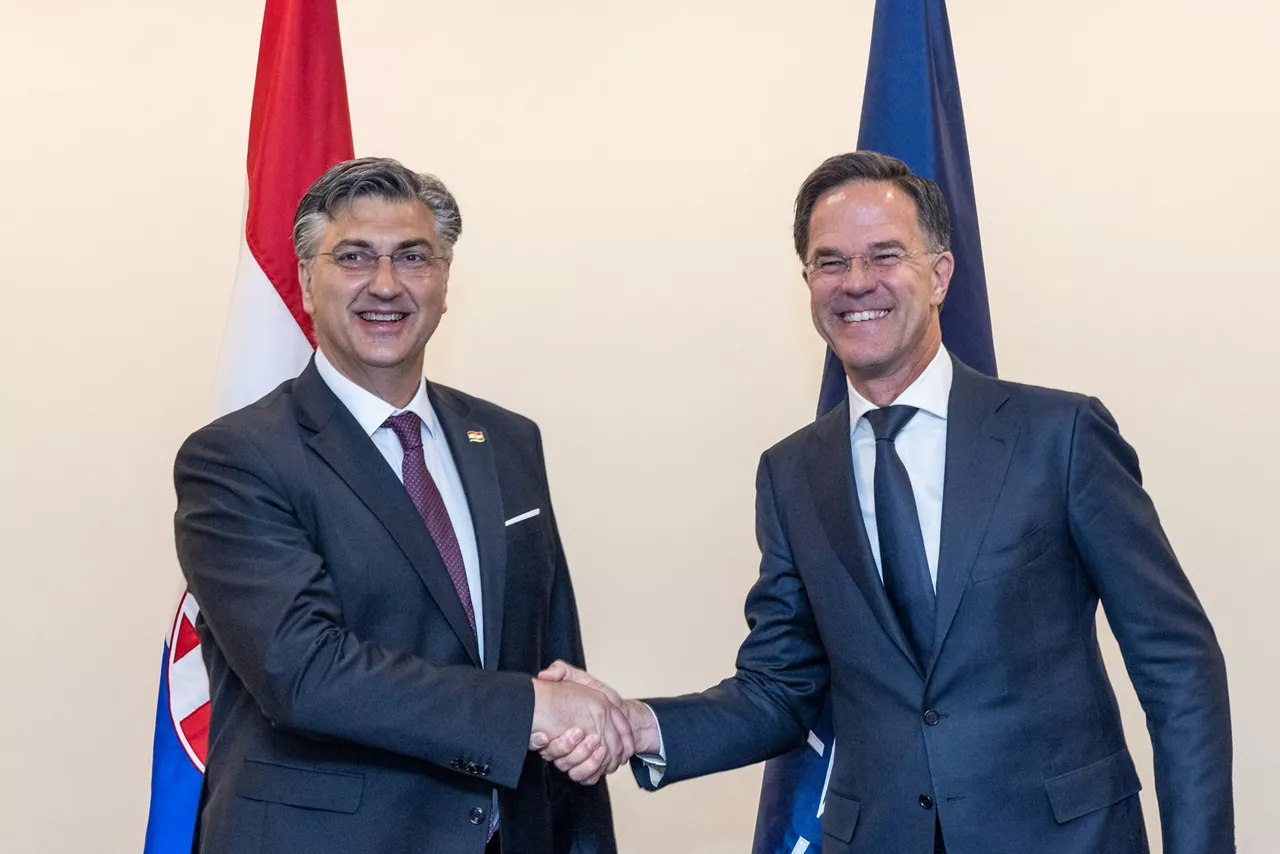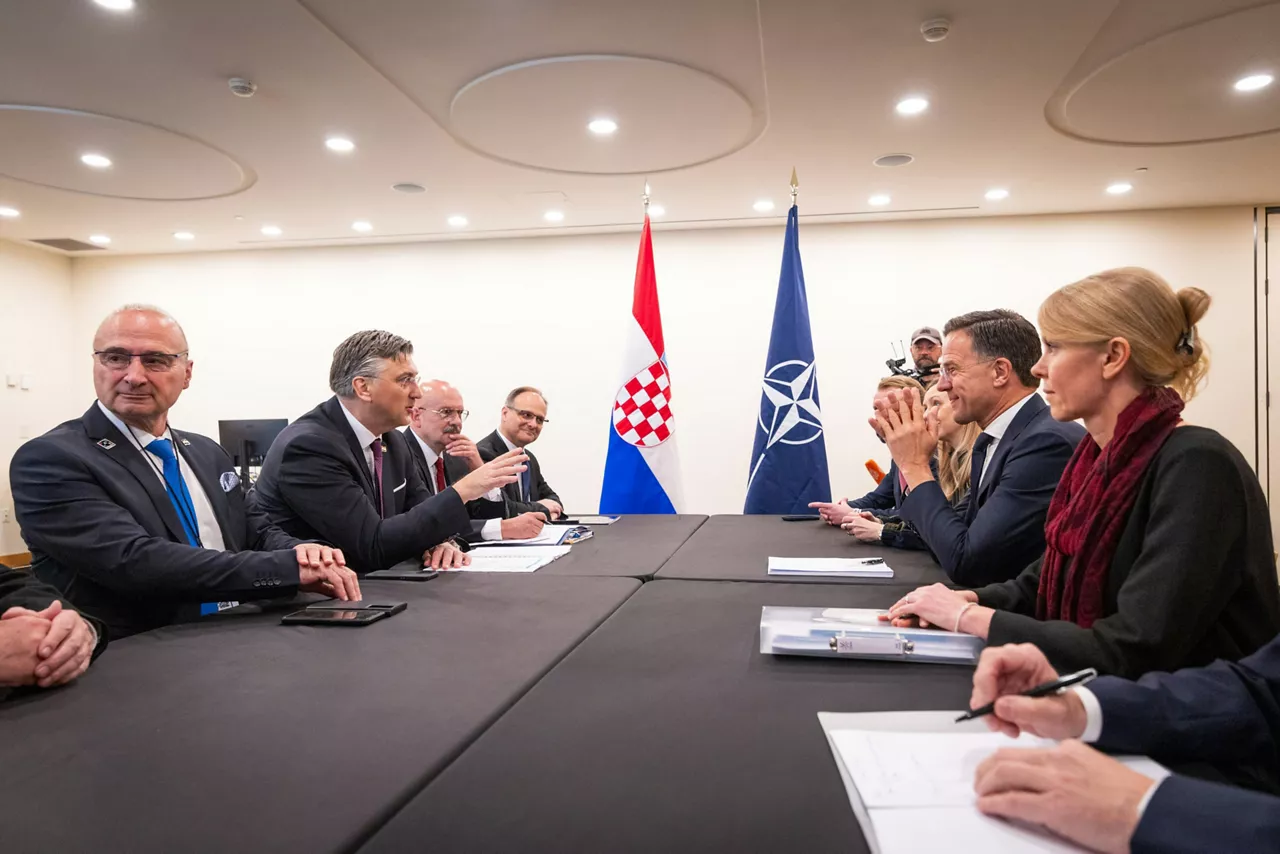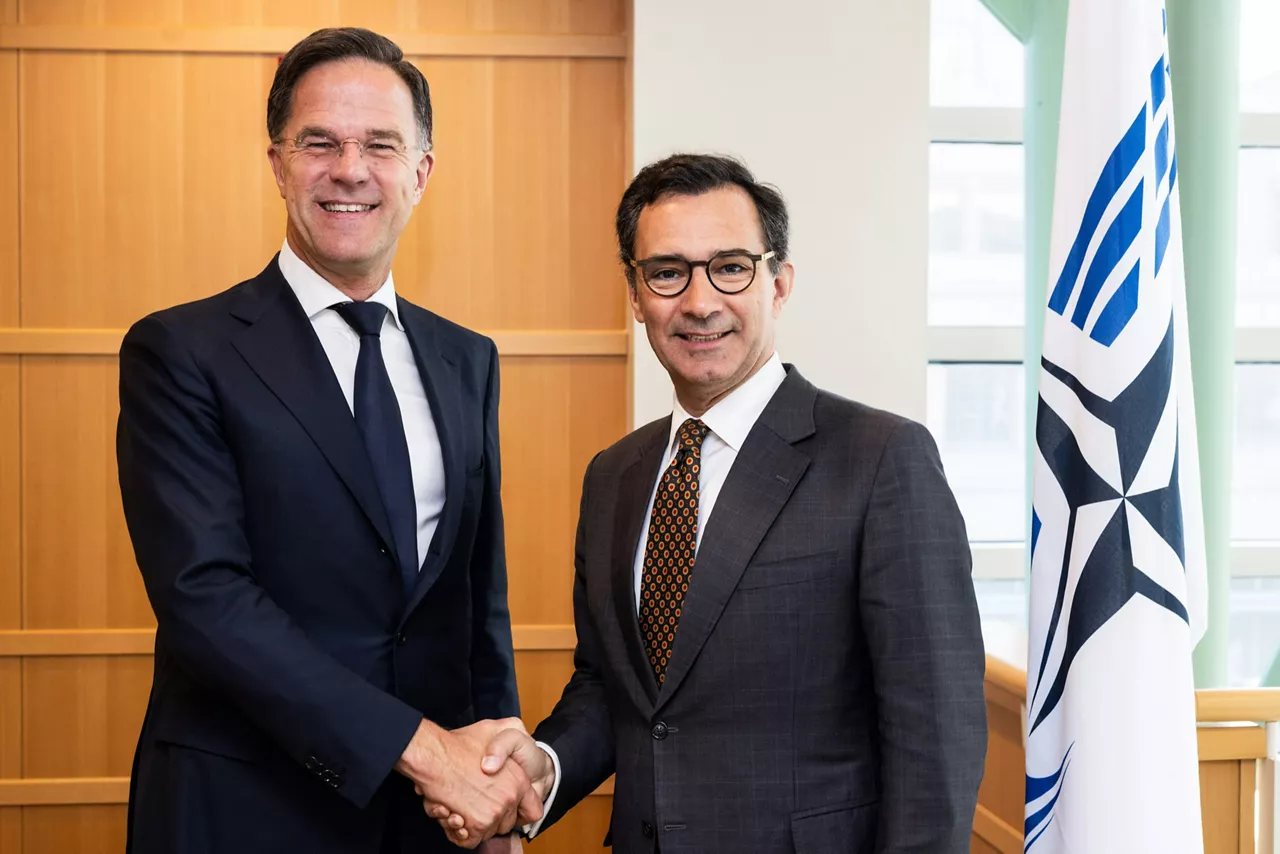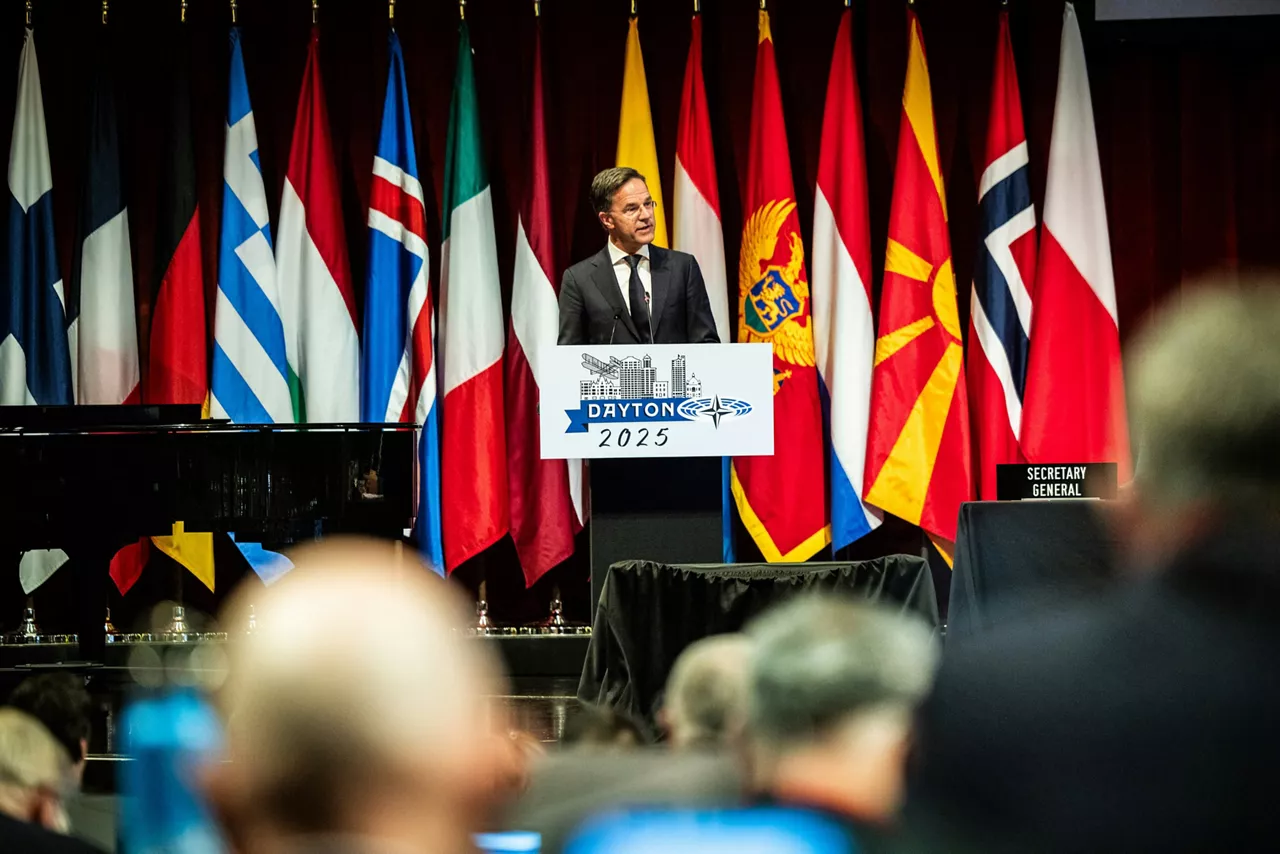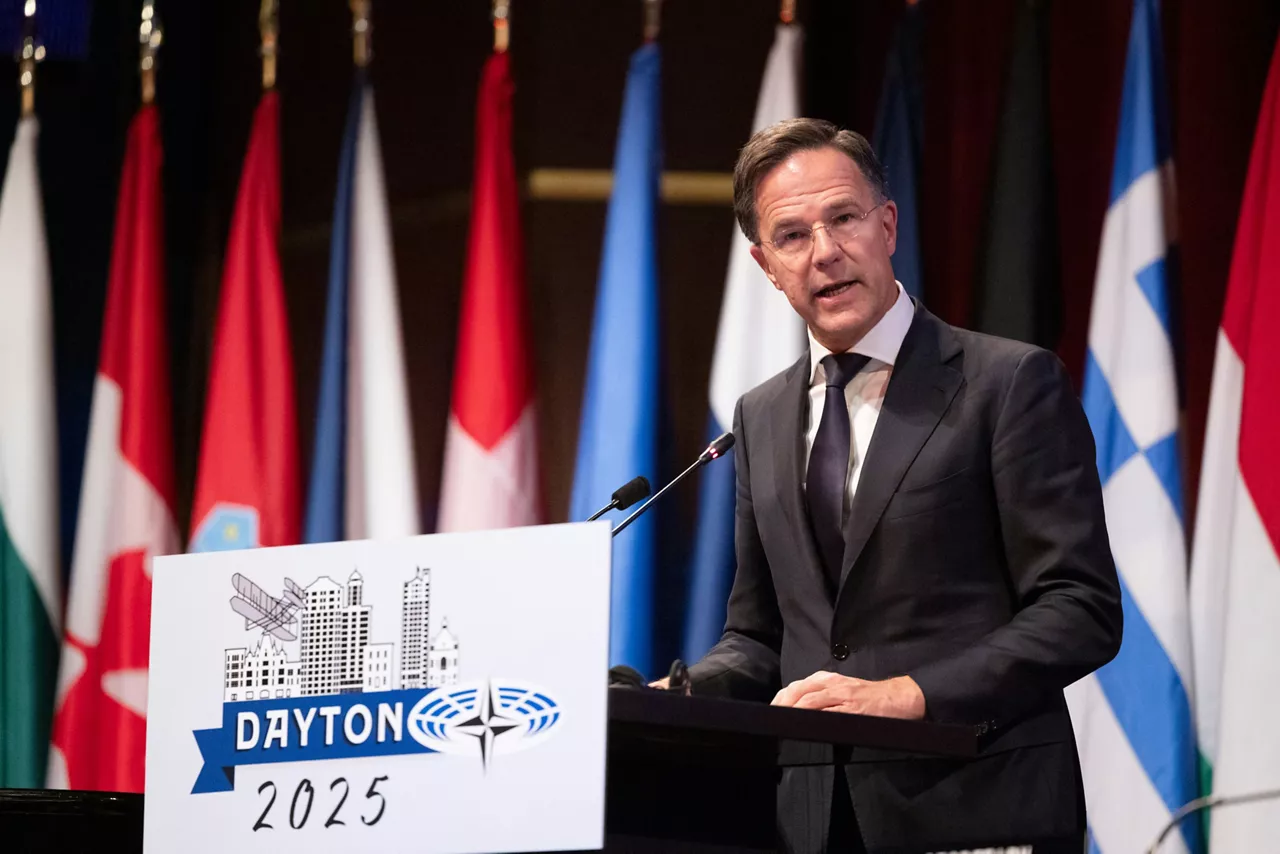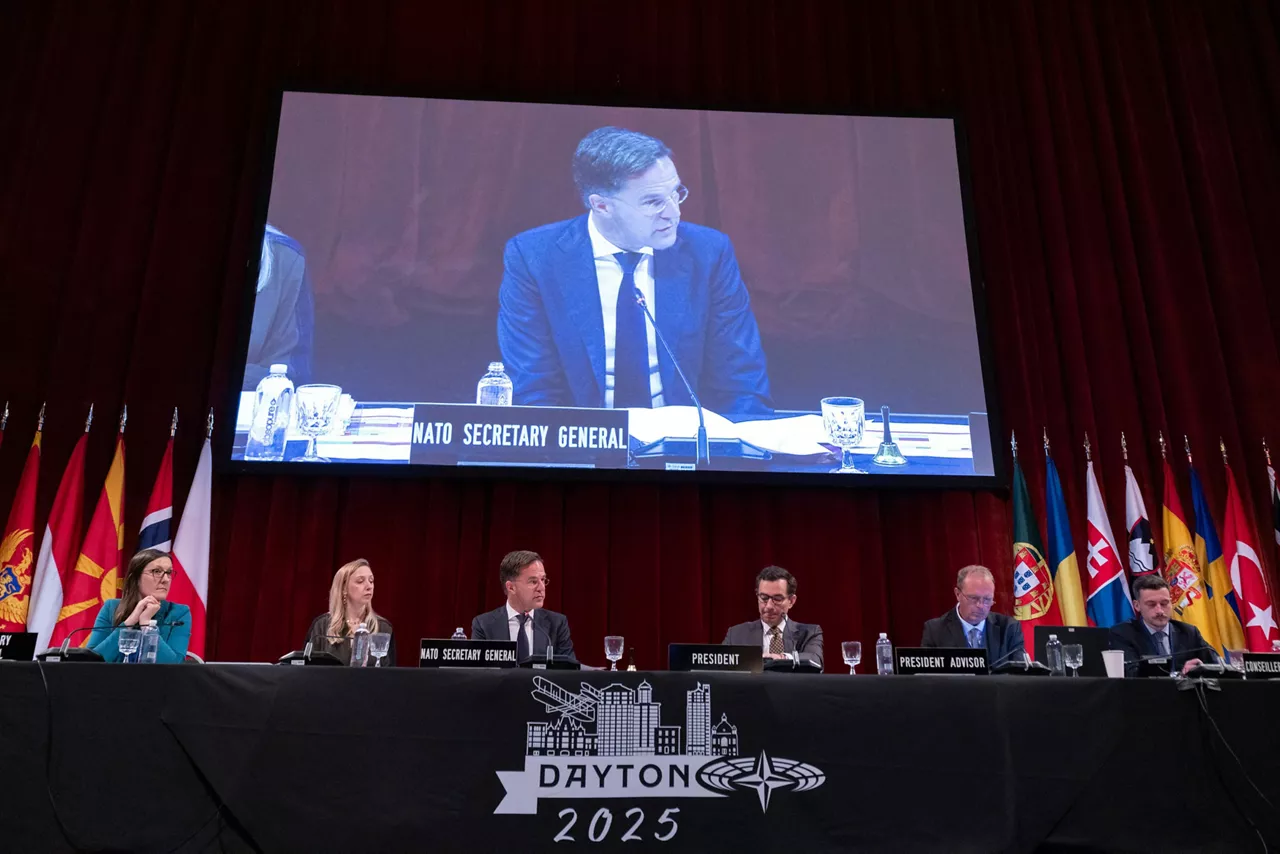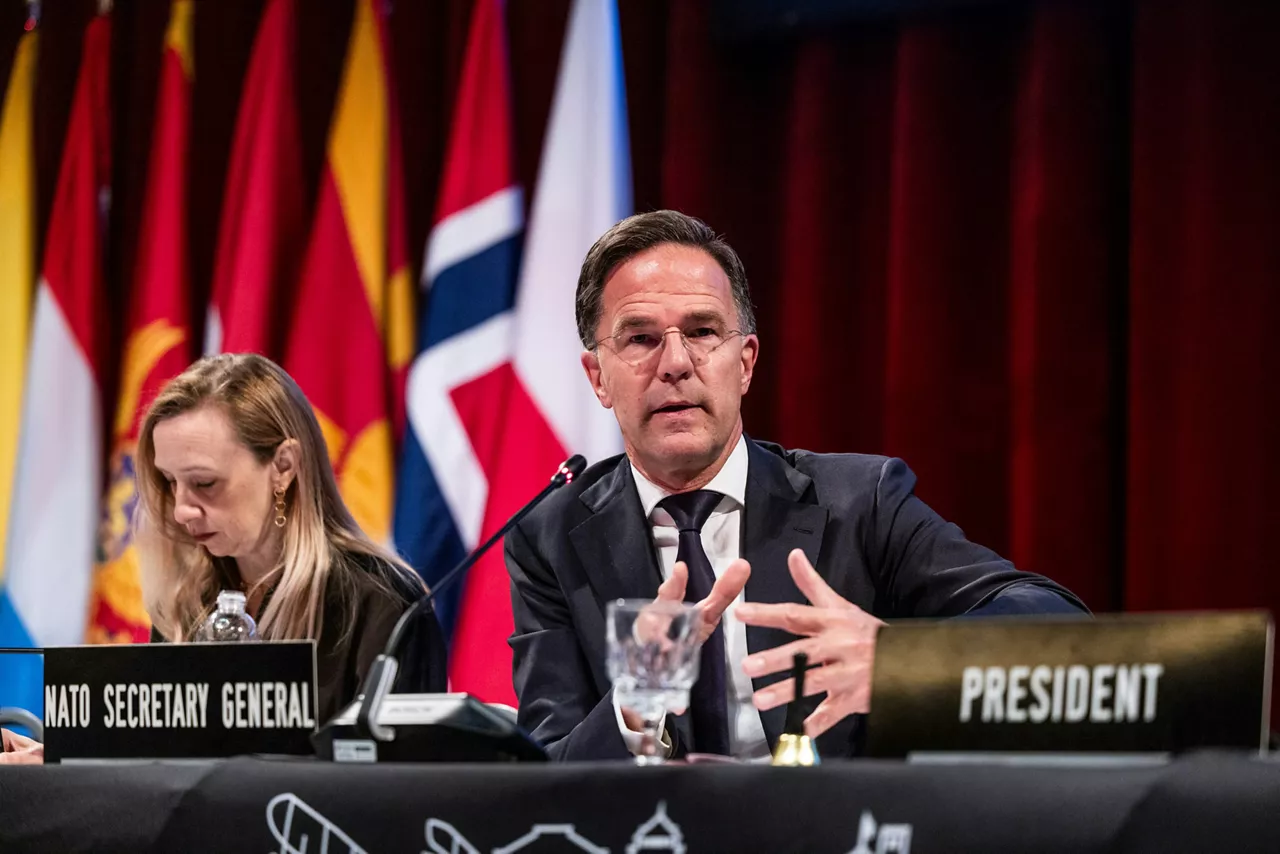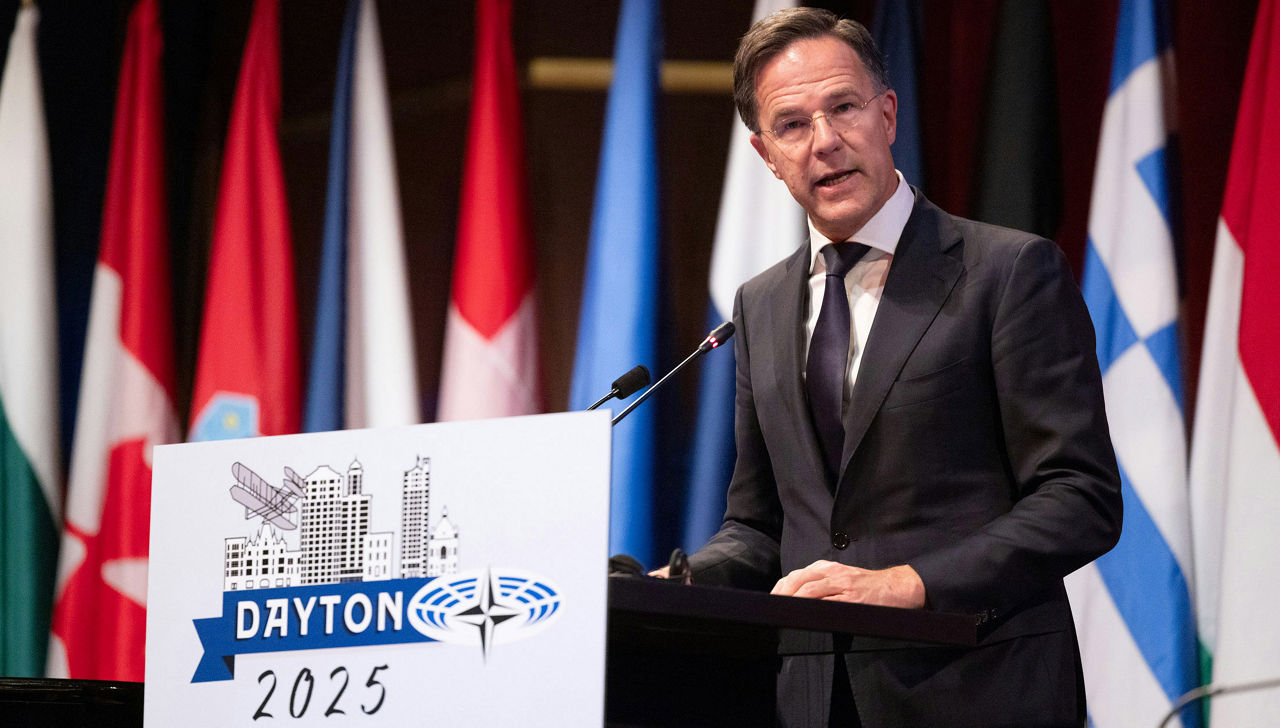Download NATO’s broadcast-quality video content free of charge

Log in
NATO MULTIMEDIA ACCOUNT
Access NATO’s broadcast-quality video content free of charge

Check your inbox and enter verification code
You have successfully created your account
From now on you can download videos from our website
Subscribe to our newsletter
If you would also like to subscribe to the newsletter and receive our latest updates, click on the button below.
Enter the email address you registered with and we will send you a code to reset your password.
Didn't receive a code? Send new Code
The password must be at least 12 characters long, no spaces, include upper/lowercase letters, numbers and symbols.
Your password has been updated
Click the button to return to the page you were on and log in with your new password.
(As delivered)
Thank you Marcos, and thank you Andrii for your incredible leadership in Ukraine. And I think it was very important to have that address today to this important gathering.
And thank you to Mike Turner and the whole US team for the warm welcome to Dayton.
First, I want to pay tribute to Gerry Connolly. He was a powerful advocate for our great Alliance, a champion of the transatlantic bond and a fearless defender of the democratic values we hold dear. We met a couple of times. First when I was Prime Minister of the Netherlands, and then twice in my present role. And I have the best of memories of these encounters. And I can tell you also in private, he could be very forceful. Let us honour his memory by continuing to stand strong and united in NATO.
Despite these sad circumstances, it is a pleasure to join you this session of the NATO Parliamentary Assembly.
And to celebrate your 70th anniversary year.
The NPA promotes peace, security and democracy.
Strengthens transatlantic cooperation.
And builds understanding about our great Alliance.
You reinforce the bond between NATO and our democratic societies.
You have my admiration and deepest thanks.
I’m so pleased we are meeting in Dayton, a great city in the great state of Ohio.
And I was delighted to hear about the Dayton Dutch Lions, a local football team – or I suppose you in the United States would say “soccer”.
The Dutch philosophy for the “beautiful game” is all about strategic thinking, adaptability, and strong teamwork.
Today, I want to share with you how we are going to build a better NATO.
At the Summit in The Hague next month, Allied leaders will take decisions to make NATO a stronger, fairer and more lethal Alliance.
Because we live in a more dangerous world.
And this is a critical moment for our security.
With multiple threats and challenges.
There is Russia’s brutal war against Ukraine,
the threat of terrorism,
intense global competition,
and flashpoints points around the world,
from the Middle East to Asia.
Russia has teamed up with China, North Korea and Iran.
They are expanding their militaries and their capabilities. They are preparing for long-term confrontation.
I am struck by the speech Winston Churchill made in the House of Commons in 1936, when he asked the question:
“Will there be time to put our defences in order? …. Will there be time to make these necessary efforts, or will the awful words "too late" be recorded?”
Peace fails when there’s complacency,
when threats go unanswered,
and when preparations are put off.
We must take action now and build up our defences.
To delay is dangerous.
To make NATO stronger, we must increase defence spending – that underpins everything.
Allies will have to invest much more to meet new capability targets, which NATO Defence Ministers will agree in Brussels next week.
We need more resources, forces and capabilities so that we are prepared to face any threat, and to implement our collective defence plans in full.
Most Allies, if not all, are due to reach the initial aim of spending 2% of GDP on defence this year.
And many have already announced plans to go much further.
We know that the 2% pledge – agreed way back in 2014 – just doesn’t cut it any more.
So in 2025, we are finalising a plan to dramatically increase defence spending across the Alliance.
This plan will mean more money for our core military requirements – hard defence.
And more money for defence-related investments, including infrastructure and resilience.
I am working closely with Allied leaders as we prepare for the formal decisions at the Summit in The Hague.
As parliamentarians, I need your help to make the case for higher defence spending with the public.
And to encourage your governments to keep up with their commitments.
And I know the debates about investing more in defence will be difficult in some parliaments.
And each of you will have an important role in building support to get budgets approved.
So I need – and NATO needs – your support.
As well as more defence spending, we need more defence production.
NATO’s aim is to enhance and expand the industrial base right across the Alliance.
We are committed to increasing defence production, fostering innovation, and removing barriers to cooperation.
The Summit in The Hague will send a clear demand signal to industry.
And we need industry to meet our ambition.
Increased defence production is not just good for our security, it is good for our economies too.
And I also expect Allies will spend more and better together on critical capabilities for our armed forces.
NATO must become stronger, fairer, and more lethal.
To make NATO fairer, we will rebalance the burden of our security, with all Allies contributing their fair share.
We all benefit enormously from the protection our transatlantic Alliance provides.
But it is vital that every member of this Alliance is pulling their weight.
And I am encouraged to see Europe and Canada stepping up with more defence spending.
A strong transatlantic Alliance is good for Europe, and good for the United States.
Becoming more lethal means strengthening our deterrence and defence posture, and providing our militaries with what they need to keep us safe.
So that no potential aggressor has any doubt about our resolve.
Rest assured – we will always be a defensive alliance.
But to protect our way of life, we will always do whatever it takes to prevent any aggression against us.
And if anyone dares to attack us, our resolve will be absolute.
To preserve peace, we must prepare for war.
Let us not ignore the lessons of history.
Dayton knows that peace can prevail.
It was here in 1995 that the brutal Bosnian War was brought to an end.
The Dayton Agreement laid the foundation for peace in Bosnia and Herzegovina.
NATO has supported peace and stability there, and right across the Western Balkans, for thirty years.
Our commitment remains just as strong today.
But above all, it is the people and politicians of Bosnia and Herzegovina – and throughout the region – that must deliver progress.
The Western Balkans has shown that peace is possible.
But today, Europe is not at peace.
Russia has brought war back to Europe.
Its aggression against Ukraine must stop – and it must stop now.
I completely condemn Russia’s indiscriminate attacks against innocent civilians over the last 48 hours.
We fully support President Trump’s urgent efforts to stop the fighting.
We need a just and lasting peace.
This is a priority that we all share.
NATO will continue our long-term support to Ukraine.
And this is not about prolonging the war, it is about ensuring Ukraine can defend itself now, and prevent any future aggression.
NATO’s command in Germany is leading the coordination of security assistance and training for Ukraine, delivering critical aid daily, and helping build its future force.
And our new centre in Poland is helping us all learn the lessons from the war.
So far, Allies pledged more than 20 billion euros in additional security assistance for Ukraine this year.
And through the Coalition of the Willing, led by the United Kingdom and France, NATO Allies have shown they are ready, willing and able to take more responsibility to help secure peace, when the time comes.
NATO has stood with Ukraine from the beginning.
We stand with Ukraine today.
And we will stand with Ukraine throughout the challenges ahead.
We know that even when the war against Ukraine ends,
the threats we face will persist.
Our adversaries will still try to dominate and divide us.
They will fail.
Because of the unbreakable transatlantic bond – North America and Europe standing together to secure peace through strength.
A stronger, fairer and more lethal Alliance is how we stay safe in a more dangerous world.
One billion people on both sides of the Atlantic are counting on us.
Let us rise to the challenge.
And stand strong together in NATO!
Thank you.
NATO Parliamentary Assembly President Marcos Perestrello
We now come to questions. Thank you for being here with us, and take some time. I must warn you that we already have a large number of questions, several dozens of them. It is highly unlikely that we will be able to go through all of them, but we'll do our best. I will set a one minute time limit for questions. I will ask you to respect this limit so that we can get more questions. And we will follow our usual procedure. We will join groups of three questions. And we will start immediately with the question for Michael Turner, Head of the American delegation. Please, Mike, you have the floor.
Michael Turner, Head of the Delegation of the United States of America
Thank you, Mr. President. Thank you, Mr. Secretary General, for being here. It's important that you interface with the NATO Parliamentary Assembly. The legislative function is important as we look to NATO's policies. They have to be adopted both budgets and policies in the legislature. So thank you for honouring us by being here. You recently made a statement about Russia's efforts to put a nuclear anti-satellite weapon into space. I believe that weapons should never be permitted to go into space. This is, I think, the Cuban Missile Crisis in space. Your bringing attention to it is incredibly important. It would destabilise all of our efforts, both militarily and commercial satellites in space. It would, if it was detonated, wipe out low earth orbit, perhaps up to a year. It has been testified before the US Congress. Thank you for bringing the attention to that. I think, collectively as an alliance, we need to make this a priority. I'd love your additional thoughts on that.
Mikko Savola, Vice President of the NATO Parliamentary Assembly
Thank you, Mr. President. Thank you, Mr. Secretary General, and thank you for your leadership. Right now, NATO, and particularly its European pillar, is addressing the right priorities. We must strengthen the Ukraine's and Europe's defence, ramp up our defence industry and train more troops. We must spend more on defence and take greater responsibility for our own security. We must also correct the past mistakes. That's why Finland is withdrawing from the Ottawa Convention, and we have heard similar voices from Estonia, Latvia, Lithuania and Poland. In a wartime situation, we must have every tool available to stop an enemy coming from the east. But my question to you, Mr. Secretary General, concerns the reinforcement of NATO's Eastern Flank. What plans does NATO have to strengthen the entire eastern border of Europe? And how will the Alliance ensure that the European countries remain commitment to increasing their defence capabilities in alignment with NATO's objectives.
Agnes Vadai, Vice President of the NATO Parliamentary Assembly
Thank you, Mr. President. Thank you, Secretary General. Fake news and malign influence on our societies and citizens from our adversaries have become more and more intensive in recent months. Their aim is very clear, to undermine the basic and shared values of our liberal democracies. Our great and beloved friend late Gerry Connolly proposed to set up a centre for democratic resilience. Up until this centre is established in NATO, HQ, which we hope is going to happen very soon, what toolkit does NATO can offer to member states and the citizens of NATO to protect themselves and our commonly shared values from these attacks? Thank you so much.
NATO Secretary General Mark Rutte
Thank you. Thanks so much for that first round of three questions. So to Mike Turner, I will absolutely keep on pressing that point. I think it is extremely relevant. It is also about weaponising beyond, almost literally beyond our borders. And we have to also be aware, collectively, of the impact it would have strategically on all of us in NATO. But of course, also beyond. So this is even bigger than our Alliance. So, you can come to me that I will keep on pressing that point. And thank you so much for your leadership. And also, for making clear that this is also of importance to the United States and to you personally.
When it comes to the Eastern Flank, obviously, and this is to Mikko’s question from Finland, clearly, we have to do more there. First of all, we have to make sure that our eight Forward Land Forces are fully staffed and equipped. And of course, a ninth in Finland, hopefully we will have soon. And then we will have next to Romania, Bulgaria, Hungary, Slovakia, Estonia, Lithuania, Latvia and Poland, we would have our ninth Forward Land Force. That will be very important. So, one is to make sure they are fully staffed, etc. We know that Germany is building up its presence in Lithuania to a full brigade level. So that is very positive. But there's more to this, because at the same time, these nine countries, of course, and all of us, all 32, but also these nine countries on the Eastern Flank, they are rapidly building up their own armed forces. We know that at this moment in the three Baltic countries and Poland have committed to defence spending close to, and in some cases even over 5%. And this is the hard defence spending they're talking about. And that means that we will have more forces, more ready at the level we need them from these countries themselves as a first line of defence. So that’s the second layer. The third layer is that we have to make sure that when it comes to all the strategic plans in NATO, that whenever Putin would try something silly, like attacking parts of NATO territory, he has to understand that our reaction will be devastating. And to be devastating, it means that you have to be able to implement and make happen all the plans we have, including all the backup plans, etc. And that is why eight countries now committing to 2% this year, six, seven already there. I think we will all have all eight countries who were not yet at 2% at 2% this year. And then, of course, agreeing in The Hague to a new target for hard defence spending, which will be considerably north of 2%. I would think the hard spending even north of 3% and then committing to the defence related spending, as I mentioned. This is a third layer to make sure that that we, that we have all our plans staffed and capable and able and trained, so that there, whenever something happens, we are able to defend the Eastern Flank. And then finally, to all the others in the room, I still hear in NATO, and here you can help from countries who are not in the Eastern Flank, ‘yes, but you're not at the Eastern Flank. So for us, it is less relevant.’ The difference between Finland and a country like, let's say, Spain or Italy, or the Netherlands or the United Kingdom, we are all in the Eastern Flank. Because with the latest missile technology out of Russia, the difference is five minutes for these latest missiles to come to us with five times the sound of speed and still very difficult to be taken out by our existing anti-missile defence system. So let's not kid ourselves, all of us, all 32 we are on the Eastern Flank, not only Finland and the other eight countries. No, we all are basically geographically located on the Eastern Flank. We really have to get that mentality ingrained in NATO.
When it comes to this initiative by Gerry, when I mentioned that he could be quite forceful, also in one-on-one’s, this was one of the subjects we discussed. As you know, Allies have not reached consensus on the proposal. So that that's just a fact. But you also know that democracy, rule of law, individual liberty, there are the core values at the heart of NATO. And that means that NATO policies are informed by these principles. This is what differentiates us, stands us apart from Russia, from China, from North Korea, from Iran and from other countries who want to harm us. And of course, NATO already has, luckily, existing structures for Allies to uphold these core principles. But when it comes concretely, as you know, to the centre there, we have to, as a statement of fact, come to the conclusion that there is no consensus. But thank you for the question, and let's collectively keep on working on this principle.
Fernando Gutierrez, Head of the Delegation of Spain
Thank you, Mr. Chair, thank you, Mr. Secretary General, for your remarks. In the European Union, White Paper for Defence, the Union establishes a set of priorities in capability gaps to be covered that start by air defence, long range ammunition, long range artillery, ammunition and missiles, drones and anti-drones, etc. However, several EU member states that they are as well, NATO members prefer to put the effort in different capabilities, such more based in new technologies such as cyber defence, space-based intelligence or command and control. First question is, do you agree with the European Union’s set of priorities in the order it established in that paper? And second, in this diversity of approaches from different countries, which should be, in your opinion, the limit to that diversity? Or in other words, how should we harmonise these approaches in order to be efficient and credible in terms of defence and deterrence.
Derek Twigg, Head of the Delegation of the United Kingdom
Thank you very much. I will be interested to hear from the Secretary General about what he thinks will count as a successful NATO Summit next month. But my specific question is, can you say more on what you believe are the further concrete steps we need to take to accelerate the growth of our defence industrial base, including how NATO countries can better cooperate to increase interoperability?
Natalia Pouzyreff, Deputy Head of the Delegation of France
NATO Secretary General, today Ukraine's army is fighting for the security of its country and its people. Tomorrow, Ukraine's army will remain a shield against Russia and make a key contribution to Euro-Atlantic collective security. Assuming Ukraine will not be demilitarised, what are the guarantees that NATO wants to provide to rebuilding the Ukrainian army. To what extent can we trust that there will be support for maintenance and logistics? How will the Allies continue to support bolstering the Ukrainian army in the long-term? Thank you.
NATO Secretary General
Let me start there, with the question from Spain, Fernando Gutierrez. And here, I think sometimes things are easy, sometimes. Because in NATO, we have, and this was established some time ago, and really reinforced by my predecessor, Jens Stoltenberg, we have the system of the NATO defence spending process. And we will, at the fifth of June when we have our Defence Ministers Meeting, agree on the capability targets. And all Allies already, on an individual basis, have said we agree with the targets we have basically been exposed to. And indeed, you mentioned already some. That will mean more manoeuvrable land formations, long-range missiles, air defence systems, logistics and obviously, ammunition, ammunition, ammunition. Refilling our stockpiles. And this will help us, because from the capability targets, we can assess the gaps immediately. Sometimes the gaps are there because many countries were not a 2%. But even the countries at 2% will have a gap to reach the capability targets. And that will inform us to a large part, what has to be the new defence spending target. And this is why I assume that in The Hague we will agree on a high defence spend target of in total, 5%. Sorry, I would not mention that, but at least I did it now. But let's say that this 5%. But I will not say what is the individual breakup, but it will be considerably north for 3% when it comes to the hard spending. And it will be also a target on defence related spending. We need this because otherwise we can never, ever, ever reach the capability targets we have to reach.
And then there is the distinction between us and the European Union. The European Union and we are working very closely together with Ursula von der Leyen, with Kaja Kallas, with Commissioner [Andrius] Kubilius. But also with Roberta Metsola, who was here. I just met her in the airport last night here at this NATO Parliamentary Assembly. And of course, with António Costa, so we are really working together as one where the EU is focused very much on all the issues to do with the internal markets, getting the defence industrial base going, making sure that the 27 work together. And here we have to particularly make sure that whatever the EU is doing is also as much as possible, accessible for countries like Norway, the United Kingdom, Türkiye, but also the United States, Canada and other NATO Allies not in the European Union. So there is a clear distinction, a clear division of labour, between the EU and NATO. We all realise this. And of course, it helps that Ursula von der Leyen, the President of the Commission, was herself a defence minister in Germany before. So everyone's saying that the new defence spending targets have to be anchored in fact and reality is right. And we will do that, because it will all flow from one, the capability targets being agreed by the defence ministers. Therefore, an assessment of the gaps. Second, this realisation that we have to equalise with our biggest Ally, United States. They are totally committed to NATO, but have also this expectation that we will equalise in terms of the overall defence spending. And thirdly, the realisation that Russia is reconstituting itself at a pace which is staggering. When you look at some of the open sources out of our intelligence services, we see in the media, from Germany, from other countries, some will say in three years they are able to attack us. Some are saying in five years out; others say in seven years. So somewhere between three and seven years we have to be ready. We are able to defend ourselves now, but we also have to be able to defend ourselves between three and seven years from now. So thank you for the question, and it is really important. In Wales in 2014, the 2% was a bit like this: ‘let's do 2%.’ The new hard defence target and the overall defence spending target, when it comes to the hard spend, and the defence related spend, has to be anchoured in facts. And it will be. The equalization, the build-up of Russia, but first and foremost, the capability targets, we will agree.
Then on the question from United Kingdom, from Derek, on a successful NATO Summit. One, agreeing the spending. This is really absolutely goal number one. It will project a NATO which is reinvigorated, which is standing proud at the world stage, which is able to defend itself now and, in the future. And with the biggest Ally knowing that the Europeans and Canada will spend what they are spending in terms of the overall money involved, and that's, I think, crucial to be a fairer Alliance also going forward. Secondly, it has to be about, as you said, about the defence industry. The problem with our defence industry is that we have fantastic companies, but they are not really producing nearly enough what we need. Particularly in ammunition, we are now producing in a year, what Russia is producing in three months. And we as NATO, and including the US, that is a $50 trillion economy, the US and all the other 31 Allies coupled together, a $50 trillion economy. Russia has only $2 trillion so 25 times smaller, and they produce four times more in ammunition than we are producing. This is completely unsustainable. We cannot defend ourselves if we would not develop at a huge speed our defence industrial base. So this will be the second big outcome of The Hague. And, of course, Ukraine, very important, making sure, depending on where we are in four weeks with Ukraine, that we will do whatever is necessary to keep them in the fight and to bring Ukraine to a lasting and durable peace. But on this defence industrial question, I mean, this is really the thing which is keeping me awake at night. I think we will get to the new defence target. I think we will get there because there is large scale support. But when it comes to defence industry, this is the hard part we have to get this going. If not, we lack a serious part of our overall deterrence against the Russians, Iran, North Korea, China. China is now rapidly ramping up its defence spending and production. They have now more ships sailing than the US. They will have by the end of the decade a thousand nuclear warheads. So please make sure, all of you can help here. We have fantastic defence industrial companies, but you have to put in extra production lines. They have to put in the extra shifts. They will always ask for 10-year contracts. We cannot deliver them. Look at the US system. The US system works from year to year. Most European countries work from election cycle to election cycle. But they will know by the fifth of June the targets. They will know by the end of June the money available. So the businessmen and women, please help them to make the necessary investments and to keep us safe.
And then on Ukraine. This is really important because, NSATU, the command in Wiesbaden was set up not only to help Ukraine now to have the best packaging of all the defence industrial support they are getting from Allies, but also longer term, to make sure that we build up the Ukrainian Armed Forces as a first layer of defence going forward after a potential long-term cease fire/peace deal. Let's hope we will get there as soon as possible. But we have to make sure there's a first layer there ready to do that. And of course, then we have other initiatives I mentioned to you. The French-British initiative, The Coalition of the Willing. There are other initiatives to make sure that, on top of Ukrainian Armed Forces themselves, we collectively will support Ukraine after a peace deal, to make sure that there is no repeat of Minsk, that Putin will never, ever try again to capture one square kilometre, one square mile of Ukraine. But the first layer of this, exactly to your point, is building up to Ukrainian Armed Forces.
Lorenzo Cesa, Head of the Delegation of Italy
Mr. Secretary General, thank you for the very hard job you have been carrying out. The Italian delegation asked to insert in the draft declaration a paragraph to draw attention at The Hague Summit on the need to improve people's understanding, about the goals, the values, the policies and priorities of the Alliance. And this is very much needed in order to counter disinformation which depicts NATO as an offensive Alliance. We know this is not the case. We are a tool for peace. This is important, not just for the countries which want to join in NATO. Their public opinions don't know exactly what the real nature of NATO is. I would like to know what the Secretary General does in general in this regard. We have to work together. We are parliamentarians, so the relationship with parliamentarians is essential, and we can give a hand in order to explain what NATO's reasons are.
Marja-Liisa Völlers, Deputy Head of the Delegation of Germany
Dear Mr President, dear Secretary General, thank you for joining us. What is your concrete vision for burden-shifting to a more European NATO? How can US and European Allies’ legitimate but seemingly contradictory interests be balanced and a suitable compromise be found? Can this be achieved within ongoing NATO processes?
Hugo Patricio Oliveira, Head of the Delegation of Portugal
Thank you, Mr. President. Mr. Secretary General, thank you for your remarks. My question is related to NATO’s southern neighbourhood. In the run-up to The Hague Summit. How do you assess the development of NATO’s southern neighbourhood action plan for the South?
NATO Secretary General
Well, thank you. Thank you so much. And first of all, to the question of Lorenzo Cesa. Of course, this is essential. This is about not letting ourselves being diverted and distracted by what others think we are. We are a defensive Alliance. We know that to prevent war we have to spend more. And we know that to prevent war, we have to prepare for war. That doesn't mean that we are an offensive Alliance. No, we are a defensive Alliance. There's nobody in NATO who wants to attack any other country. There's absolutely no interest of doing that. And it was the Russian Federation, under its current leader whatever you call him, Vladimir Putin, who has decided to invade Ukraine and to have this increasingly belligerent rhetoric against NATO. And working together with North Korea. And we know that North Korea is getting a lot of technology in return for their support for Russia's war in Ukraine. We know that China is a key enabler of that war, by delivering dual use goods, sanctions circumvention and what more. And we know, of course, that Iran is involved. And Iran gets money from the Russians, and they use that money to stir up divisions in the Middle East. So these four are working together. We should not be naive about it. But we indeed, we are a defensive Alliance. We are the strongest defensive Alliance in world history. And we have to make sure by the decisions we make in The Hague for the long term, the next 25 years, we will stay the strongest defensive Alliance in world history. And that's our collective endeavour over the next four weeks, but also beyond the Hague Summit, to implement everything, particularly as I said before to the UK question on defence industrial production. So I need your help, but we also should stay a little bit cool under this. And a bit like the British Queen, “keep calm and carry on.” Even when some of our adversaries are giving all these signals that we would be offensive, but we are not. That's absolutely clear.
Then on the on the burden shifting, to Marja-Liisa’s question. Here, of course, this is already happening. Let's first start by acknowledging that the United States is not only involved in NATO for historical reasons. The United States realises that to stay safe, they need a secure Atlantic. They need a secure Arctic, and they need a secure Europe. That is of a vital direct interest to the defence and security of this country long-term. So that's why we work together. Of course, there was a mistake you could say after the First World War. And we know the famous speech Churchill delivered in here in the United States, Christmas 1941, a couple of weeks after Pearl Harbor, where he basically said, in a very subtle way, let's not repeat that mistake of getting disengaged from Europe. Because the long arm of history will then reach out again to the new world, to come to the defence of the old. So there's that reason. But again, when it comes to the long-term security for the US, it is a secure Atlantic, Arctic and Europe. So there is an absolute mutual interest to do this. But we also know that the US being the biggest power in the world, and being the biggest economy in the world has more issues to think of than only the Euro-Atlantic theatre. And that's why the burden shifting is taking place, and rightly so. At this moment, the US is about delivering 44% of all the capabilities of NATO, that will come down by 2032 to 30%. That means that the non-US Allies are stepping up from 56% to 70%. And then with the extra money spent, we can take over more of that, if necessary, because we know that the US gradually will want to pivot more towards Asia, etc. But still keeping a very large conventional presence in Europe. So I'm pretty confident that we can do this. I had very good discussions with Pete Hegseth in the Pentagon, with Marco Rubio, with President Trump. And I'm really confident that over the next month and the next nine months, 12 months, we will really be able to steer this whole process. Spending more, making sure we stay together as an Alliance, but also enabling the US to pivot more towards other problems they have to attend to, which is basically only logical.
And then on the southern neighbourhood, we are working very hard. Of course, we have a Special Representative for the Southern Neighbourhood now, Mr. Colomina. He’s even my Special Representative, ‘the Secretary General’s Special Representative for the Southern Neighbourhood.’ And he is doing a fantastic job. And we will open the office in Jordan. Of course, we have the NATO Mission Iraq, which I visited in February, doing marvellous work there to help Iraq develop security forces and its defence capabilities, also longer term. And of course, we are there on their request, but they highly value our presence and what we are doing. And we have, at this moment, I think, in total, over 600 and that number will grow a little bit over the coming months and years, of our Allies being active in Iraq, helping them. But then we are also now working with other countries, Mauritania, for example. And we had a very good meeting between the ambassadors in the NAC in Brussels, together with the ambassadors from Egypt, Mauritania, Tunisia, others to really discuss how we can take the next steps when it comes to the southern neighbourhood. And why? Because we cannot have China and Russia gaining more and more influence in that part of the world which is so close to us and therefore vital to our interests. This is exactly the point your Prime Minister made, the Prime Minister of Spain made, the Prime Minister of Italy made, and others over the last two years. And that's why we are really stepping up when it comes to the southern neighbourhood. And I'm completely committed.
Jesse Klaver, Head of the Delegation of the Netherlands
Thank you, President. Good to see you here, Mark. You, yourself have been a member of parliament and head of government for quite a long time. And you've experienced on your own how difficult it is, can be for politicians to decide on more defence spending. How do you reflect on your time in office, and what have you learned? And what are the lessons you can give to us to be successful in meeting the spending obligations? I would say not a spending target, but a spending obligation, than we were in previous years.
Darya Safai from Belgium, Head of the Delegation of Belgium
Thank you so much. As we speak, a European state neighbouring the EU is being attacked by rockets and drones provided by the Ayatollah dictatorship in Iran. Russia has been provided with 8000 Iranian Shahed drones and 200 Iranian Fateh ballistic missiles in their attack on Ukraine. Moreover, servicemen of the Iranian regime are present in Ukraine training Russian specialists in handling their systems. In case of a future Russian aggression against a European NATO member state, Iran will once again actively support this operation. And last but not least, the Iranian regime is already an active participant in hybrid warfare against our Alliance, ranging from sabotage and targeted killings to cyberattack. Hence, my questions for you, will the Alliance take this threat seriously? If so, are plans being made to address a possible armed support from Iran to Russian aggression on European Ally? Thank you.
Joanna Kluzik-Rostkowska, Head of the Delegation of Poland
Thank you very much. Now in Poland is a debate about how similar or dissimilar will be a war between Russia and NATO country, compared with the war between Russia and Ukraine. We'll see what will happen. But I have no doubt that we need some things, do homework from the Ukrainian exercise, from the Ukrainian Front Line, the first. Refresh our thinking. I'm thinking about the NATO countries, yes, our thinking about what the war is, how weapon we need, how we cooperate to win the future war. And the next, because we are under hybrid war, I think that that we need new thinking about intelligent service, about this kind of role of intelligence service to do a lot inside NATO. And my question is the new command thinking about it? Thanks.
NATO Secretary General
Very good question. First to Jesse Klaver’s question. Totally spot on. When I became Prime Minister in 2010, I thought for the European Union was about the market and the currency. And NATO absolutely clearly why we need it. However, there was also this thinking that the situation with Russia was so much more stable in 2010-2011. So we could continue getting the peace dividends in and therefore not increase, even decrease defence spending. For me, the big moment was in 2014 not only Crimea, March, but particularly as we in the Netherlands have all in those days felt, was the MH17 [flight]. And then Russia, all my dealings with Vladimir Putin flatly denying any involvement in eastern Ukraine, not being present there. He said, ‘so I can't help you, Mark.’ And I say, ‘well, then I have to accept your view on this, but at least you speak the language. You know the people better than I do. Can you help to get the next of kin back?’ Because the bereaved ones want to be united with their loved ones. And this, for me, was really a moment where I started to realise that the European Union, first of all, is not only about market and currency. But also by working together. 27 countries being embedded, as the Netherlands, one of the richest countries in the world, but very small. Being embedded in such a structure is also providing a form of collective safety, maybe not security, because that's NATO. But the fact that you work together helps; you're not standing alone. And then, of course, for NATO, the hard defence spending. And luckily, over the last five years, we were able, also with support of your party and others, to increase defence spending to a more acceptable level. But clearly, it's not nearly enough. And we have to do much more, but that is what we all now have to face other than three or four countries who are already there. So I think that's at least my personal journey, personal journey on this.
When it comes to the question from Darya Safai, thank you so much. As I said before, Iran is working together with Russia, with North Korea, with China. These four are closely knit, and they help each other, and they all three help, so Iran, North Korea, China, are helping Russia in the war effort against Ukraine. And clearly the most powerful in this foursome is China. But Iran, exactly as you said, is helping with some key drone technology, the Russians in the war effort. And that needs to stop. And what the US is doing at the moment, also bilaterally with Iran, to come to hopefully some understanding with that country, I think, is important. And I completely support what the American President and his team are doing there. By the way, also with Syria, I think it's good that the deadlock was broken on Syria. That also the talks are ongoing and of course we have to take that step by step. Because of the type of process we are in, it will not be a fast process. It will be slow, but it has to be done.
And then on the question from Joanna Kluzik-Rostkowska, thank you so much. Basically two questions. One is we have to capture all the lessons from Ukraine. And in Poland, we have now JATEC, opened in February by Radmila [Shekerinska] the Deputy Secretary General. She was there with the leaders of the Polish Republic. And this is very important, because we will capture the lessons from the war in Ukraine. And we know that Ukraine is at an extreme speed innovating. The Russians are trying to keep up with a sort of delay of two or three weeks. They copy what Ukrainians are doing, but Ukrainians are extremely industrious, innovative. And this will give us so many new insights in how war-fighting will develop. And I'm not a General. I'm a Secretary General, but I'm not a man in uniform. So obviously, it is first of all the military people who will capture the lessons and then also advise, ask the politicians how to best take forward all these insights when it comes to defence procurement, when it comes to reconstituting our own armed forces going forward, taking lessons from Ukraine. And on hybrid, and Poland is, of course, has to do with it, but all over NATO we are seeing these attacks. And basically, hybrid sounds very cuddly, but it is state-sponsored terrorism. We really have to call it what it is. What happened in 2018 in Salisbury in the United Kingdom. What happened with the attack on the National Health Service United Kingdom, postal system in Belgium, jamming of commercial airplanes in some of the Baltic Republics, but also assassination attempts. We have seen all of that, and we call that hybrid. But of course, it is much more. That is why NATO is now so much more active. And, for example, the cutting of critical undersea infrastructure and the fact that this Baltic Sentry was established in only 10 days by Chris Cavoli, our Supreme Allied Commander, after the 25th of December when that attack took place between Estonia and Finland on this critical infrastructure between those two countries. And what I learned from this is when something is an activity, you do not always need consensus by the 32 so that's when I decided, on the fifth of January from now on, we will only have activities and no missions. But this is a joke, of course. Otherwise, I get into trouble with our ambassadors. But it shows you that we can react fast, and we have to keep on doing that. And not always to do exactly back what they do to us, but sometimes also asymmetrical. And the fact that the Russians are now really getting more and more active in the East Sea/Baltic Sea, is testimony to the fact that NATO is really getting its act together with our Allies.
Dimitrios Kairidis, Head of the Delegation of Greece
Thank you. Yes, my question was partially answered, but only partially, so allow me to insist a little bit as a parliamentarian, Mr Secretary General, like everybody else in this room, my first and foremost job is to listen to the voters and to try to respond to their anxiety. So allow me to reiterate a question that has been asked to me time and again by voters and journalists in my home country, and this has to do with the fact that you come from a country that, even today, does not spend 2% on defence. The Netherlands is an important country. It has a large economy. It counts a lot. It has an economy the size of the 10 smallest economies of NATO. So it's not unimportant.
And the fact that there was a shift in your thinking in 2014 makes things a little worse, because you remained in office until 2024, way past 2014, so I wonder, for all the forcefulness and persuasiveness of your arguments to increase spending, how do you respond to your critics about that? Given the fact that the Netherlands is probably the one country in NATO that can borrow the most easily. It has a very low public debt of 45% and even after the second invasion of Ukraine, it continues to spend less than 2%. Mr President, my country spends more than 3% despite its promise. Thank you.
Sevilay Çelenk Özen, member of the Delegation of Türkiye
Thank you. Mr President, thank you. Mr Secretary General, Türkiye, an important NATO Ally, is at a historic turning point. After decades of conflict, weapons are being laid down, and a new democratic chapter is beginning in the country. This new democratic awakening and the associated opportunity for peace is not only important for Türkiye, it also has the potential to bring a positive peace for the entire Middle East and therefore also for Europe. So my question is, what role can NATO and the NATO PA play in this context to promote and support this peace process, what steps could be taken, and how could greater international support help to ensure a successful and long term impact? Thank you.
Dario Hrebak, Head of the Delegation of Croatia
Mr Secretary General, in light of commemorating the 30th anniversary of the Dayton Peace Accords, I would like to ask you now, how can we help today Bosnia and Herzegovina to be effectively set on a sustainable path towards its future, NATO and EU membership, a sustainable path, especially in the context of the current situation where the anti-NATO and anti-EU sentiments fuel the secessionist movement. So my final question, how can we help as an Alliance Bosnia and Herzegovina' s path?
NATO Secretary General
The Netherlands is spending 2% and next year we'll spend 2.2% in all the NATO calculations. So I'm happy they are there. We are there. I'm there. Netherlands is there. And of course, my previous answer still stands. But luckily, over the last couple of years, we were able to redress that when it comes to the Turkish question, I think there are three issues, three opportunities here. First of all, the leadership role Türkiye is taking when it comes to Syria. I think that's extremely important. I had long discussions with President Erdoğan on this. Secondly, Türkiye, when it comes to defence industrial production, you have a huge defence industrial base. And I'm in close contact with the Secretariat of the Turkish defence industry, working closely with the presidency of Türkiye. And one of the things I'm really promoting is for NATO to be as open as possible to all the defence industrial companies, because we need everybody. And it is enough money to make sure that all the defence industrial companies within the EU, outside the EU, here in North America, in Canada and the US, that they all can flourish. But obviously what we want is more output and not higher prices.
You know the joke, the Patriot system will be delivered in 10 years, is it the morning or in the afternoon? Why is that important? Because in the afternoon the F-35 will arrive. And this is only the US defence industrial base could make the joke for Rheinmetall, for Leonardo, for some of the defence industrial companies in Türkiye, because we really have to force them to put in the extra production lines, the extra shifts, speed up the production, particularly when it comes to ammunition, where Türkiye is working closely with some of the ammunition industries here in the US and Texas, and that means also working on all the issues around our supply chains.
And finally, when it comes to Türkiye, fighting terrorism, because your country has had its share of terrorism, but not only Türkiye, also other countries. For Türkiye, of course, this has been a big issue, and fighting terrorism is a core task of NATO. And I will always make sure that we will focus next to our traditional defence, also on fighting terrorism.
And then to the question on Bosnia. And here, I want to be a bit harsh, because I believe the troika presidency in Bosnia. We saw them yesterday at this play at a dinner, and I love them all three. I have no friends or enemies in the Troika Presidency of Bosnia and Herzegovina. But we have to be a bit harsh with them. They cannot export their problems to the rest of the Western Balkans or to the rest of Europe or to NATO. They have to take care of the country themselves. And when some of them have troubles or problems with the fact that there is a High Representative, or that some of the Dayton agreement is still there. It's not because you and I like that. It is because they do not govern the country themselves. And as soon as they do, we can all step away and say, ‘this is great. Bosnia is now a regular country like the other Western Balkan countries, and like everyone in Europe and in Canada and the US. And let's pray for that.’ And of course, you will help them. I will help. We will all help. EUFOR is there, KFOR in Kosovo, and EUFOR in Bosnia. And we work together, etc. So, we all be there as guarantors. But we cannot accept any falling apart of the country - that's simply unacceptable to NATO, to anyone. But when it comes to solving this, they have, in the end, to start doing this themselves. And last night at least, showed that things to Dayton and we can have these arguments in peace. But still, there are arguments. But they're not fighting each other literally, but now we have to really gently push them to a position where they take collective leadership and just posturing against the other and then hoping that it will become more popular with their own constituent peoples is not helpful. And that's basically my message when I was in Sarajevo in March - please start to rule your country, and let us step out. I would love that.
Raimond Kaljulaid, Head of the Delegation of Estonia
Mr Secretary, thank you very much, and you're making an absolutely correct point in talking about the importance of defence spending. What I want to ask you is that we, of course, in Estonia, have also studied the capability targets, and we estimate that we need north of 5% to actually meet them. So, my question is that, as I understand correctly, you're proposing this 3.5 in hard military spending plus something in, I don't know how to call it, soft military spending, but soft spending on top of it. So, to some people that might sound like you know, we're trying to make the figures look better by cooking the books in a sort of way. But my question is, can you assure this audience that, if indeed all the Allies spend 3.5%, these capability targets will be met in a timely fashion, and that we are actually able to deter our adversaries the way we need to. Thank you.
Raimonds Bergmanis, Head of the Delegation of Latvia
Thank you, Mr President. Secretary General, there are more and more points about the possibility, renewal of the NATO-Russia Council. I would be interested to hear your view on this. Is anyone really ready to resume anything in common with aggressor state, which, from a position of youth force, has violated and continue to violate the most elementary human rights as well as International Law. Do you consider the possibility of such Council being re-established? Do you think that this would not destroy the already unity among the member states of the Alliance? Thank you.
Dagur Eggertsson, Head of the Delegation of Iceland
Thank you, Secretary General, for your good work in extremely complex political seas. I wanted to ask two things, one about the current status of the upgrade of Russia's strategy for NATO, and closely connected to that, if we do need a more comprehensive Arctic strategy for the High North. We have seen political tensions within the Alliance. And my question really is would a comprehensive process studying the Arctic and the High North, with participation of everyone, could that lower their tensions within the Alliance and get us behind something and thus stronger?
NATO Secretary General
Thank you. Thank you so much. First on the Estonian question from Raimond Kaljulaid: listen, the idea is the following, and I'm not going to get into all the numbers, because we have those discussions still ongoing with our Allies, but the idea is to have a number on what was currently the 2% which has to be a new number, as I said before, it will be considerably north of 3%, because otherwise you cannot reach the capability targets. Our assumption is that with the new number, when we agree on the number, it has to be able to deliver the capability targets, one, to equalise with United States, goal number two. And three, to do it as soon as rapidly as possible, because of the Russian build up, the constant reconstitution of the Russian Armed Forces, and particularly their stockpiles. And of course, there is an absorption capacity issue, because you cannot go from 2% in one year to over 3%, whatever the new number is. Why not? Because you need the defence industry output. You need to hire the people. You need to do all the other stuff, etc. So there is a sort of max to what you can do each year. So you will reach it in steps, but not like we did in 2014 saying, "Let's have 2% in 2024", and nothing happened till President Trump came on board in 2017. No. Here we will have clear incrementals each year, take into account, let's say, all the spending plans your country has to reach that. But overall, we have to prevent that we just ramp up prices by saying all the countries have to go from two to, if they are not yet, at over three to that new number in one year.
So this will take a couple of years, but that's okay. We have that time. We don't have to reach it in one step. So that's the hard spend. But then there is this issue of military mobility, the issue of that our society as generally, our civilians have to be prepared for what not only a natural disaster, but also war. I was in Norway last week. In Norway, but also in Sweden and other countries, Finland, it is totally normal, I think also in Estonia, it's totally normal for the average citizen, not in the military, to be aware of what it would mean if war breaks out or a natural disaster would hit, and what then your task will be. So that's military mobility. It is making sure that the civil society is prepared for what might happen. But it's also about building your defence industrial base, not buying from the defence industry base. That's the hard spending.
But when it comes to defence related, it is also developing the defence industrial base. Ambassadors are currently discussing, or diplomats in Brussels, in various committees, what exactly will be in that category of defence related. We hope to finish that as much as possible before the Summit. If we cannot completely get it done before the Summit, no problem. But I think these are the big-ticket issues we have to think of when it comes to defence related spending, and that will bring you to a new number. And that will make sure that the next 25 years we stay safe. Then there's absolutely no plan for this Council to reconvene. So that's the simple answer to that. And then when it comes to the question. So that's a question from Raimonds Bergmanis and from Dagur Eggertsson from Iceland. I was in Norway last Thursday, close to Narvik, and we had a fantastic visit there, together with the Norwegian Prime Minister, Defence Minister, Foreign Minister, and the Chief of Defence, and we discussed the Arctic. And the good thing is we have seven countries in NATO, seven out of the eight Arctic countries are in NATO, of course, Iceland, but also Denmark through Greenland and Sweden and Norway and Finland and Canada and the United States. And these seven countries are working more and more together, and also are discussing with NATO how NATO can get more involved, step by step, for example, when it comes to ISR or other activities.
So we're working on that. I expect our ambassadors in Brussels to discuss this probably next week or in the very near future, to see also as NATO, we can get helpful when it comes to the Arctic. And we know the sea lanes are opening up. We know China, Russia are more and more present there. We know we have a total lack of icebreaker capacity, so we really have to solve a number of very serious issues. But it was very illuminating to be there and to look at the map of the world, not from the position of Amsterdam or Oslo, but looking at it from the position of the North Pole, and then to see how that whole area is rapidly changing because of climate change. And therefore the impact it has on our collective defence, and therefore the how NATO could be helpful, getting incredibly more involved here, supporting the seven NATO High North Allies.
Dragan Kovachki, Head of the Delegation of North Macedonia
Mr. Secretary General, building on your morning address, to what extent should NATO enhance its deterrent capabilities and moreover, to tailor the resilience building measures in the Western Balkans as a region of strategic importance, in order to prevent, deny, or to fight with the hybrid threats, and to, in a way, isolate the third party actors that might intervene, having in mind that bilateral issues preventing the prosperity of the region, and having said that may provoke instability in the region, and by extension, that of Europe as a whole. Thank you.
Sverre Myrli, Deputy Head of the Delegation of Norway
Thank you so much. It's good to hear you had interesting days in Northern Norway last week, as you mentioned in one of your answers some minutes ago, there is an important cooperation between NATO and the European Union in the field of defence and security, a very important cooperation we very much support, even if Norway is not a member of the European Union. Norway has signed an agreement with the European Union to strengthen defence cooperation, and we are already participating in many other EU initiatives. Many EU members are members of NATO, and many NATO members in Europe are also EU members, but not all: the NATO countries, United Kingdom, Türkiye, Iceland, North Macedonia, Montenegro, Albania and Norway are not members of the European Union, so how will you ensure that these countries will remain closely involved in the emerging cooperation between NATO and EU? Thank you.
Yehor Cherniev, Head of the Delegation of Ukraine
Dear Secretary General, dear Mr President, dear colleagues, I can assure you that Ukraine is ready for peace quickly, and we move quickly and constructively toward it, but there are no any signals that Russia is ready even for a cease fire. Just last night, they launched several 100 of drones and missiles on our civilian cities. They are concentrating thousands and thousands of troops near our Sumy and Kharkiv regions. Putin was quite clear with his intent to invade our country. Is it the preparation for a peace? Definitely not. So it's our shared responsibility to force Moscow to stop and the key of its ability to work to wage a war is their economy. We must impose sanctions that will lead to its collapse, full sanctions on oil and gas, metallurgical and financial sectors. We also need continued military support, first and foremost, air defence systems like Patriots. They can save lives of our civilians. We also need artillery and long-range weapons. We also need strategic investment in Ukraine's defence industry. With additional funds, we can produce faster and more weapons. While we are ready for a cease fire, we recognize that without reliable security guarantees, this will only be a pause in these hostilities, so NATO membership is the most effective guarantee and our priority. We also recognize that an international military presence on the territory of Ukraine can also serve as security guarantee as we move towards NATO membership.
Ukraine is not fighting just for a territory. We are defending our common principles as freedom, democracy and justice, and they are not abstract concepts, but the very foundation of the world order. We are looking forward to the upcoming NATO Summit in the Hague, where Ukraine's rightful place at the negotiation table will be confirmed. Such a signal would be clear and powerful. The Alliance is united, and the commitment to Ukraine is unwavering. So, dear Secretary General, can Ukraine count on the invitation to the NATO Summit and to the meeting of that NATO-Ukraine Council as a signal that Ukraine's path to NATO is irreversible? Thank you.
NATO Secretary General
Thank you so much. I'll take them again in the order. So when it comes to the question from Dragan Kovachki, yes, we have to enhance our deterrence capabilities. Generally, what we are doing at the moment in NATO is based on the whole NATO defence planning process, agreeing country by country which capabilities that country needs to deliver to make sure that clicked into the overall NATO system. Each country is doing what it needs to do if there would be an attack towards NATO territory. Of course, there is also the issue of hybrid. You rightly mentioned that, and we also have to make sure that we all understand that, of course, there are four countries working together, as I mentioned before, but it doesn't mean that it is limited to those four when it comes to destabilising activities against NATO territory. We should not be naive about that. Then the question of Norway, about defence cooperation between Norway and the EU, very good to hear that you have that agreement, I think, between Norway and European Union when it comes to defence cooperation. But the question, of course, is, how can we make sure that as NATO and the EU we do the max we can? Well, there is one thing holding us back that is not the personal relationships, that is not the joint vision Ursula von der Leyen or Kaja Kallas or Commissioner [Andrius] Kubilius or António Costa or Roberta Metsola, or myself and Radmila [Shekerinska], the Deputy Secretary General of NATO, we all agree basically on the way forward. But let's be honest, decision-making in the EU is based in many cases on unanimity of the 27; decision-making in NATO is in many cases based on decision-making in unity by the 32. And without going into detail, it's not always easy to bring all 32 Allies to unanimity, and it is the same case when it comes to the EU.
So we are constantly discussing how we can help each other to make sure that NATO is doing stuff which helps the EU to get to 27. And then the EU, what the EU can do to help NATO to bring the decision making to the level of the 32. And we agreed, Ursula and myself, that we will never have the fact that sometimes it is difficult to get to unanimity, get into the personal relationships. And if necessary, we will pick up the phone and only hang up when we have found a solution for a particular hiccup when it comes to these two unanimity rules, because in many cases, you can have workarounds, etc, which are acceptable to all Allies and to all member states in the EU. And I give you one example, when it comes to defence industrial cooperation and the EU is doing a lot there, and I really applaud that. I'm constantly also arguing with our colleagues in the EU make sure that it is as open as possible, that also companies from United States and companies from Türkiye and Norway and the United Kingdom can tap into this. And of course, Iceland and Montenegro and all the countries you mentioned who are not in the EU, but are in NATO. And in total, these are nine countries: 23 NATO Allies are also in the EU, and there are nine Allies who are not in the EU, but still in NATO, that we work as much as closely together and as one without unnecessary barriers. Where I do understand that when the EU is spending European euros on the defence industrial base, that I think it is important to have that you will also come sweating and come to fruition within Europe. But that is possible. We have some very practical cooperation between great industrial companies from the United States, together with companies in Europe and therefore working together. Take, for example, the interceptor missile factory in Bavaria, which has been built for Patriot systems and other air defence systems. There's a very practical cooperation which basically makes it possible to really work as boundary-less as possible. I think this is crucial. So it's not because the vision is different, or the long term outlook, but again, these are two democratic organisations, in many cases, based on unanimity.
And then to Ukraine, you mentioned a couple of things. First of all, developing the Ukrainian defence industrial base. Denmark and Lithuania took the lead here, and other countries are following. Norway, for example, is helping here, but also many others to invest in the defence industrial base in Ukraine. And we know that in some calculations, you still have 10 to 15 billion euros spare capacity in the defence industrial base in Ukraine. And that means products for the war against Russia's aggressive war against Ukraine, but also to develop your own economy, because also, there comes a defence dividend from these type of investments, which will help Ukraine. So that's clear. And then when it comes to a long-term peace, be it a cease fire, long-term or a full peace deal, I know that you guys are willing to sit at the table and negotiate. I was very happy that last Friday, President Zelenskyy sent his top team, including the Foreign Minister and Defence Minister, to Istanbul to basically smoke out Russians and make clear to the rest of the world that Russians were not serious in those talks in Istanbul by sending this historian there as the leader of their delegation, who just wanted to go back to where he left off in March 22 when it came to the root causes of the war. And of course, this is absolutely not helpful, and won’t bring us anywhere, but that at least made clear that you guys are willing to play ball. And that is crucial, because let's agree that, thanks to President Trump, the deadlock was broken. He started to engage again with Putin, and I commend him for that, because it is important, because we also need that line of activity and his personal leadership here to get things going.
When it comes to the Summit in The Hague, I'm in close contact with President Volodymyr Zelenskyy on this, we hope to publish the programme as soon as it is ready. But of course, I clearly hear the request. We will, by the way, have a NATO-Ukraine Council during next week, Friday with the Defence Ministers during the Defence Ministers meeting. So this is also ongoing work.
Zoran Dragisic, Head of the Delegation of Serbia
Mr. Secretary General, my question will be about Kosovo and Metohija. Do you plan to increase the number of soldiers in KFOR to protect Serbs from systematic terror by the regime in Pristina. We know very well which situation we have in Kosovo, and we appreciate a role of KFOR. But we believe that KFOR must be stronger in Kosovo to protect Serbs from the terror. Thank you very much.
Marko Mihkelson, Delegation of Estonia
Thank you, Mr. President. Mr. Rutte, I'm strongly supporting your efforts, your tireless efforts to make our transatlantic Alliance stronger and more united in these critical times. And as you mentioned, we have to be ready to really stand against those threats, what existential threats what we have. But I would argue that this, the test of resolve of ours, is not something which can be envisioned in the future, but actually this is going on daily, actually, in Ukraine. This is the test ground of our Alliance and our resolve, where you know our leaders, when A they say they definitely should say also B. I reminded two weeks ago, some of our Allies made a very strong statement about ceasefire. If ceasefire is not met, there will be consequences. Two weeks later, we see that Russia has increased aggression. My question to upcoming Summit, which is very important also to show our resolve, is that actually to repeat question, what Mr. Cherniev just asked you, what is your position? Should we see during The Hague Summit also the NATO Ukraine council meeting to be happen? And also, can you ensure that Mr. Zelenskyy is invited to the Summit? Thank you.
Emma Lewell-Buck, Delegation of the United Kingdom
Thank you President, and thank you, Secretary General. the Alliance has been slow to respond to growing threats as we are rapidly scaling up our defence spending, our defence industrial base and civilian resilience to confront these challenges. How do we remain agile to respond to an ever evolving threat landscape and prepare for not just the coming years, but the next decade and after that?
Jarno Limnell, Delegation of Finland
Thank you, Mr. President, and thank you, Secretary General. Of course, when we are talking about defence and security, we have to talk about the technology. And as we know we humans, we are developing technology at the moment in more radical and faster way that we have never done in humankind history. And as we know this speed is accelerating. Just think about what has happened in the beginning of this year, for example, in the AI field, quantum technologies or space technologies. And of course, the human mind, psychological warfare is happening all the time, also towards NATO countries. So Mr. Secretary General, my question is that. How you evaluate how well NATO as an Alliance, is currently keeping up this accelerating technological development. Thank you.
NATO Secretary General
Thank you. Thank you so much. First to Serbia, let me start by saying that I don't think it's helpful to keep on using these terms like, in which you said regime in Pristina. I mean, it doesn't work. I think Serbia is the biggest country in the Western Balkans. We need your leadership in all of this. So please, can I suggest you refrain from that type of rhetoric? And I know you have your issues with Pristina, but let's just phrase it a bit more neutral would be my suggestion. That as a sort of start to my reaction. I have very good contact with Aleksandar Vučić, the President. He visited me in March. That was after I was in Sarajevo and in Pristina the week before. And we discussed at length, also the role Serbia can play to make sure that we de-escalate the tension in the Western Balkans. And again, like the United States is the leader in the world, Serbia is by far the biggest country in the Western Balkans. And therefore we look for you and to you for leadership and being able to do what is possible to de-escalate tensions. We also discussed, clearly, the accountability questions on what happens in Banjska and other events in 2023. I think that is important. And when it comes to KFOR, it plays a very important role to make sure stability remains in Kosovo, in the region. We will never announce, let's say, the posture of KFOR, whether it will go up or down or whatever. We don't want to make anyone wiser than he is. But you can rest assured that we will do everything as an Alliance to make sure that KFOR has what it needs to be of maximum use. But please, again, I also count on Serbia to play a positive role, and I know in many cases you do. But we need to see more of that to de-escalate the tensions in the Western Balkans, but also particularly when it comes to Kosovo and, of course, Bosnia.
Then to the Estonian question. Yes well, listen, before Donald Trump became President, there was no breaking of the deadlock. So let's start by acknowledging that it was him, and I really want to thank him for that, by starting that debate, making sure that we move beyond, of course, continuing giving Ukraine what it needs in intelligence support and military support to stay in the fight and to be in the strongest possible position. But also to break that deadlock with the Russians. And he was the only one who could do that, being the President of our biggest Ally, the United States. And then, of course, what we then are saying, oh, but we wanted to go faster. But, I mean, he is now President for three or four months. This war is ongoing now for three years. And at the end, we also have to respect, I think, his role in all of this, and that he has to make that calculation when the time comes to take next steps with Ukraine and where necessary, against Putin, if he is not helpful, etc. But really, I would urge all of us to respect also his role here and the fact that it doesn't work to constantly put pressure on the Americans, saying you need to do this and that, knowing that before the 10th of January, there was absolutely no discussion ongoing with the Russians. And again, I'm happy that he started that. And as I said about the Summit, I clearly hear all the requests. It's up to me to make sure we have a program which is as useful as possible. It will be a very concise Summit. It will be much more like London, 2019 than Brussels, 2018. So really very much focused when it comes to the content debates. But as soon as the as the program is published, you will see how we will deal with some of these questions. Of course, United Kingdom, this is really what the Summit is about. It is about the money. It's about the defence industrial output. And it is about making sure that Ukraine has what it needs to stay in the fight and to have that long term commitment to Ukraine and again, what happened the last 48 hours or 72 hours. The last two nights, these indiscriminate drone attacks and missile attacks on innocent civilians. I mean, this is not attacking defence bases or airports or whatever. No, these are attacks on cities and innocent civilians going about their lives, losing their loved ones. And I find this terrible, and it shows you that that Russia, at this moment, is absolutely not serious of taking next steps. I think that's what you can conclude from the last 48 hours. So we have to make sure, and that's the third goal for The Hague, that we keep Ukraine strong.
And then to, finally, the Finnish question from Jarno Limnell. I was in Japan two months ago, and we discussed the sixth generation fighter jet. It was interesting debate, because we know that UK and Italy and Japan are working on this. There are other consortiums within NATO working on sixth generation fighter jet, and we're already, the F-35 is more a platform than only a fighter jet. That will be much more the case for the sixth generation. And there's always this discussion. Do you still need the big-ticket items like fighter jets and tanks, etc, or can we completely move now, in the days of AI and quantum computing, to the new technologies? I think, and I'm again, I'm not a military guy myself, so here I also have to listen very careful to what the advice is coming from our military leaders. But I think the growing consensus is that you need a combination of yes, the big-ticket items, still, also in the future. But clearly working as interconnected as possible, and from a design point of view, designed in conjunction, not AI as a layer over it, but really being integral to the whole design of these next generation big-ticket items like the fighter jets and our tanks, etc. And also when it comes to our capabilities at sea. And I think that's the real lesson. And when I spoke yesterday, last night, before we had our dinner with the lady who is flying the F-35 which was there on display, I was really impressed. Also from her, to learn that she was an F-16 pilots before. Now she's flying the F-35. And she said, the big difference is that F-16 was fantastic, but the F-35 is really the next wave. And it's not only flying the plane, it's also making use of all the information coming in from all the various sources, and that's why you have this deep vision into enemy territory, etc. And that will only grow with the sixth generation, with AI coming on board and with quantum computing. So I guess that there is reason to believe that it will be a sort of fusion between the traditional defence industry and these latest technologies, and I think it's crucial that we design them in conjunction, and not doing the one first and then have a sort of, ‘okay, oh yeah, let's now put AI in.’ But do it from a design point of view, as much hand in hand. Thank you so much.

